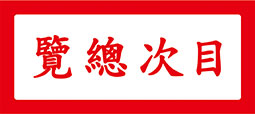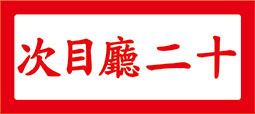Victory in diplomacy is akin to triumph in the battlefield. It steadies and improves the fortune of the country, galvanizes those who are despondent, and bestirs those who are indifferent. For these reasons, the work of diplomats is of paramount importance. Ambassador Shen Lyu-shun (沈呂巡大使) was a formidable and distinguished diplomat who passed away in January this year. News of his death was received with sorrow by all. By presenting the work and writings of Ambassador Shen, the Chinese-Heritage Virtual Museum pays tribute to a role model of our generation and an inspiration for future generations.
Curatorial and Editorial Department
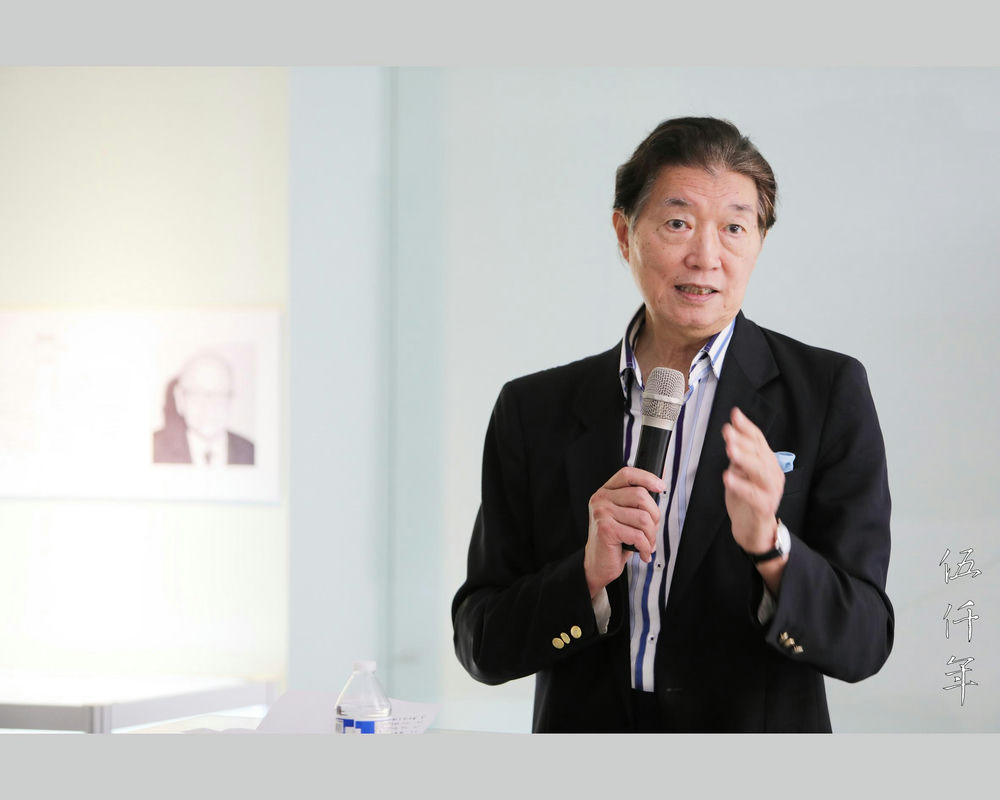
Ambassador Shen Lyu-shun delivering a special lecture at the opening ceremony of the Commemoration Exhibition of the 99th Anniversary of the May Fourth Movement on 4 May in the 107th year of the Republic (2018)
Chinese international diplomacy commenced in the 11th year of the Hsien-feng reign (1861) when the Tsungli Yamen (Ministry of Foreign Affairs) was first established in Peking. From then it would be fifty years to the end of the Ch’ing dynasty. During this period, foreign aggression grew ever more intense, yet outstanding ambassadors appeared one after the other, such as Kuo Sung-tao (郭嵩燾 1818-1891), Anson Burlingame (蒲安臣 1820-1870), Tseng Chi-tse (曾紀澤 1839-1890), Wu Tingfang (伍廷芳 1842-1922), Hsü Ching-ch’eng (許景澄 1845-1900), Tcheng Ki-tong (陳季同 1851-1907), and Lou Tseng-tsiang (陸徵祥 1871-1949). Many of the ambassadors stationed abroad were by nature inclined towards political reform. When the Wu-ch’ang Uprising broke out in the 3rd year of the Hsüan-t’ung reign (1911), Lou Tseng-tsiang and Wu Tingfang in particular favoured the republican political system, and they both urged the Ch’ing emperor to abdicate. After the founding of the Republic of China in 1912, they were appointed foreign minister in succession.
The Ministry of Foreign Affairs of the Republic of China has continuously enlisted those knowledgeable about East and West, many of these diplomats are now commended by history because of their accomplishments and integrities. During the one hundred and twelve years since the founding of the Republic of China, not a day goes by without her diplomats strategizing the direction of the country whilst treacherously encircled, tackling powerful enemies in thorn-filled terrains. It is discernible that the diplomatic tradition of striving against the tides of misfortunes has continued and is carried on by the Republican government from the Ch’ing dynasty, and that the lofty ambitions of the Confucianists in two epochs to save the country from catastrophes are comparable.
As the United States has always been the foremost diplomatic stronghold, Chinese ministers and ambassadors assigned there were the finest of their generations, such as Yung Wing (容閎 1828-1912), Chang Yin-huan (張蔭桓 1837-1900), Wu Tingfang (伍廷芳 1842-1922), Liang Cheng (梁誠 1864-1917), Koo Vi Kyuin (顧維鈞 1888-1985), Sze Sao-ke (施肇基 1877-1958), Wang Chengting (王正廷 1882-1961), Hu Shih (胡適 1891-1962), Wei Tao-ming (魏道明 1899-1978), Hollington Hsien-kuang Tong (董顯光 1887-1971), George K’ung-chao Yeh (葉公超 1904-1981), Tsiang Tingfu (蔣廷黻 1895-1965), Chow Shu-kai (周書楷 1913-1992), Shen Chang-huan (沈昌煥 1913-1998), and lately Shen Lyu-shun (沈呂巡大使). At a time of grave internal political confrontations and predatory communist hostilities across the Taiwan Strait, Ambassador Shen defended the honour of the Republic of China in adversity and pursued her national interests amid perils. He was indeed an exemplary model for future generations.
Ambassador Shen was born on 12 November in the 38th year of the Republic (1949) and passed away on 6 January in the 112th year of the Republic (2023). He was a native of Hou-kuan, Fukien Province, and a grandson of the sixth generation of Viceroy Shen Pao-chen (沈葆楨 1820-1879). He graduated from the Taipei Municipal Jianguo High School, School of Law and Business at Chung Hsing University, and the Department of Diplomacy at the National Chengchi University. Afterwards he studied at the University of Pennsylvania, attaining a doctorate degree.
In the 71st year of the Republic (1982) he became a consultant at the congressional group of the Coordinating Council for North American Affairs. In the 77th year of the Republic (1988) he was the assistant director-general of the Ministry of Foreign Affairs, and the first section chief of the Department of North American Affairs. In the 80th year of the Republic (1991), he was the director general of the Taipei Economic and Cultural Representative Office in Kansas City. In the 82nd year of the Republic (1993) he was the director of the Political Division, as well as the director of the Congressional Division of the Taipei Economic and Cultural Representative Office in the United States. In the 85th year of the Republic (1996) he was the director general of the Taipei Economic and Cultural Representative Office in the United States. In the 88th year of the Republic (1999) he was the deputy representative of the Taipei Economic and Cultural Representative Office in the United States. In the 92nd year of the Republic (2003) he was the director general of the Taipei Economic and Cultural Representative Office in Geneva, Switzerland. In the 97th year of the Republic (2008) he was the representative of the Taipei Representative Office in the European Union and Belgium. In the following year, he was the deputy minister of the Ministry of Foreign Affairs. In the 100th year of the Republic (2011) he was the representative of the Taipei Representative Office in the United Kingdom. In the 103rd year of the Republic (2014) he was the representative of the Taipei Economic and Cultural Office in the United States. In the 105th year of the Republic (2016) he retired and returned to Taiwan after rotation of the political party in power.
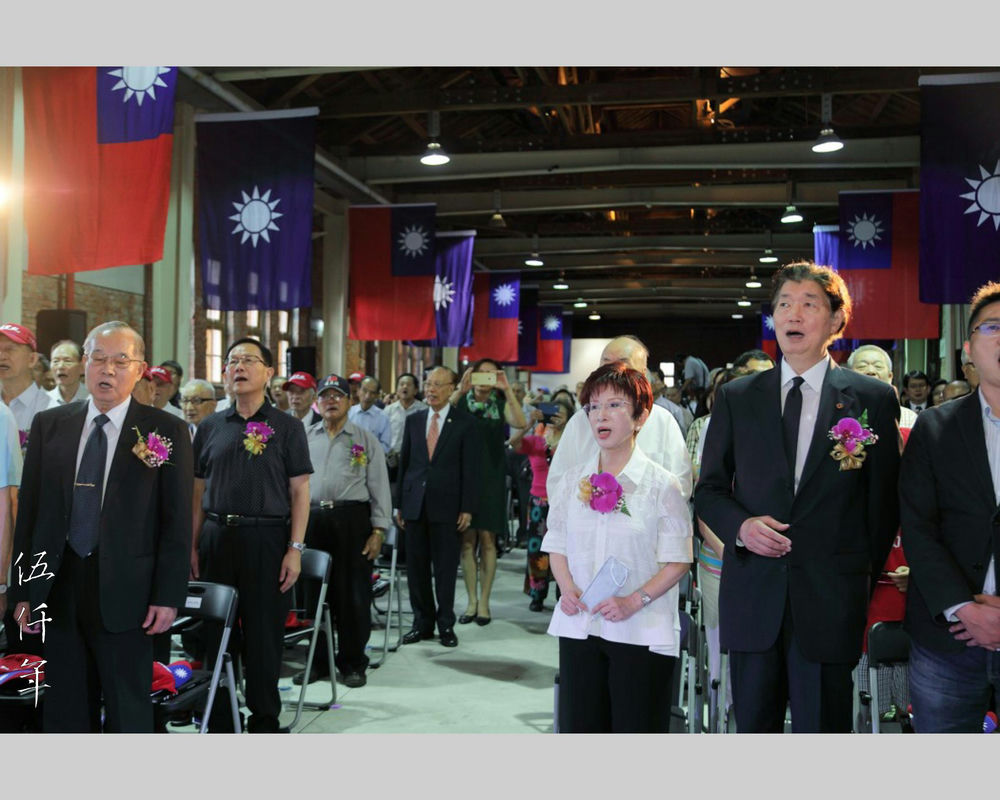
Ambassador Shen Lyu-shun singing the National Anthem at the Commemoration of the 80th Anniversary of the Marco Polo Bridge Incident and the War of Resistance Against Japanese Aggression on 8 July in the 106th year of the Republic (2017)
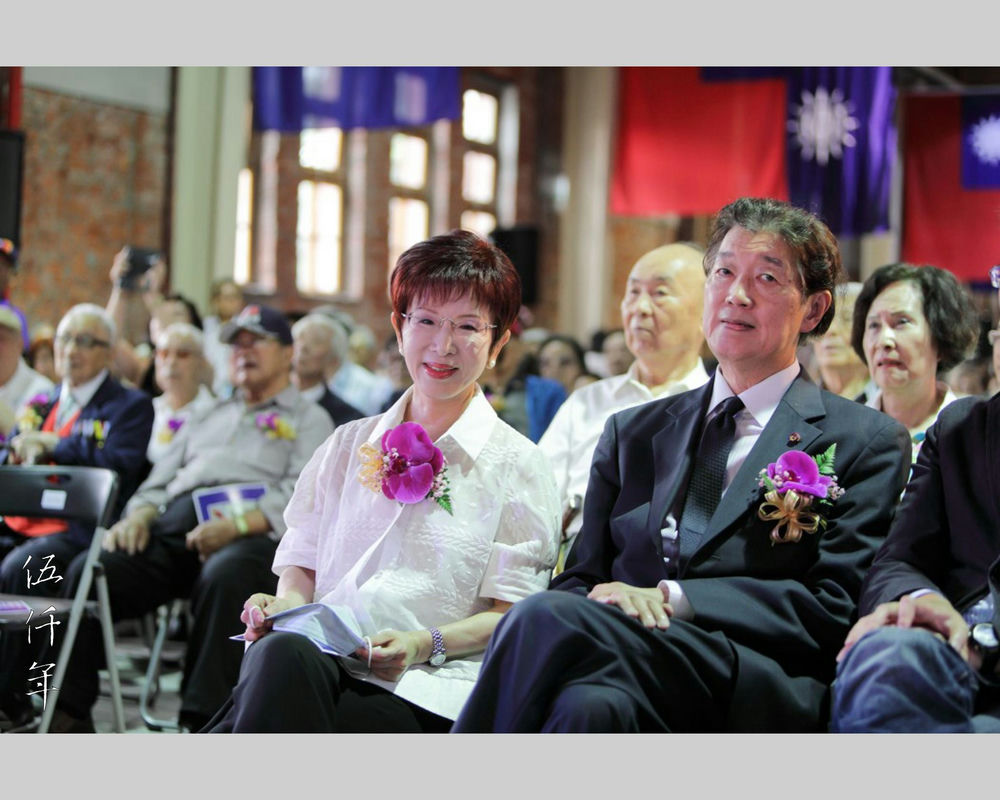
Ambassador Shen Lyu-shun and Ms. Hung Hsiu-chu (洪秀柱主席) at the Commemoration of the 80th Anniversary of the Marco Polo Bridge Incident and the War of Resistance Against Japanese Aggression
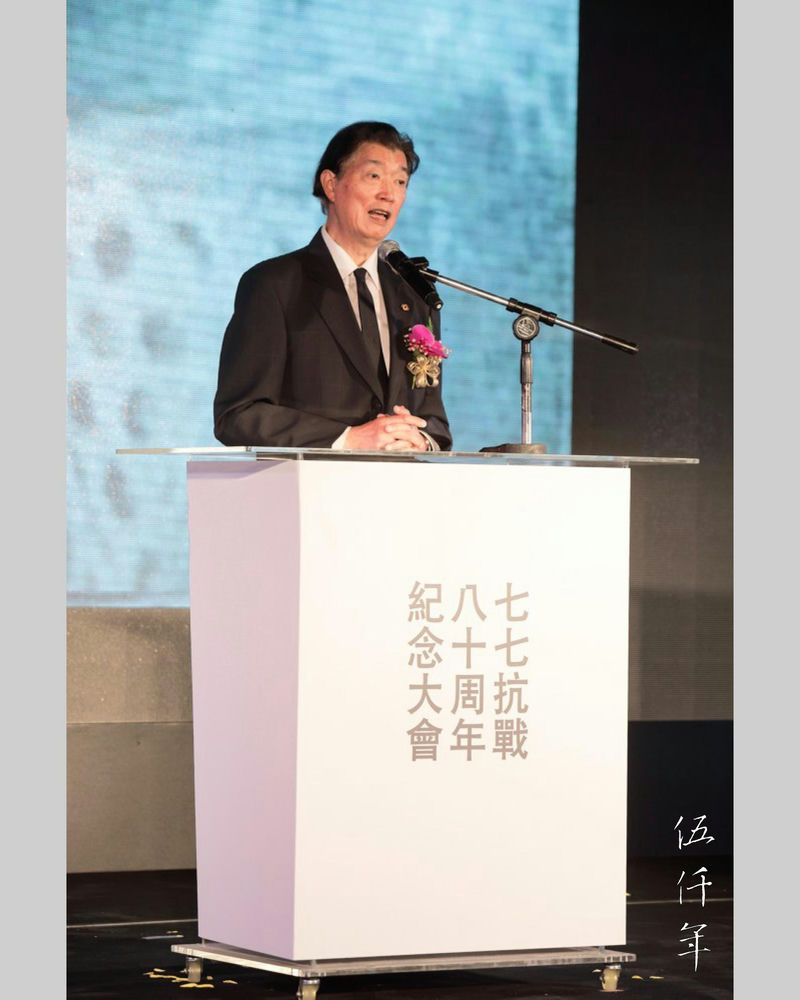
Ambassador Shen Lyu-shun delivering a speech at the Commemoration of the 80th Anniversary of the Marco Polo Bridge Incident and the War of Resistance Against Japanese Aggression
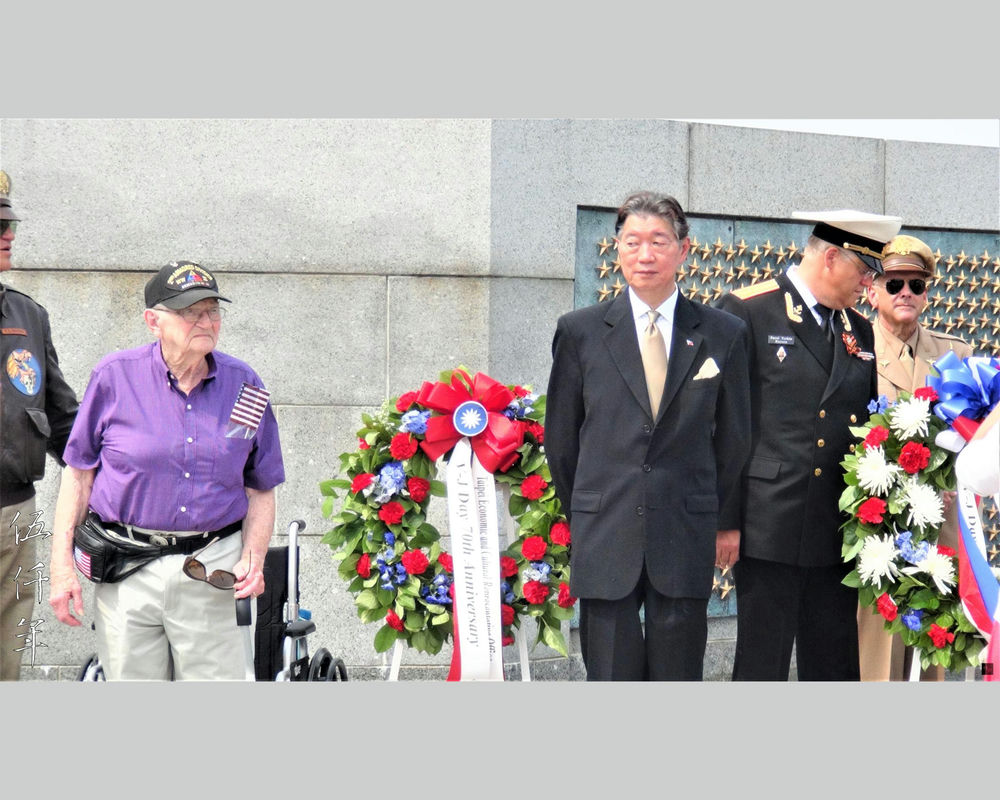
In the 104th year of the Republic (2015) the United States Government invited Ambassador Shen Lyu-shun to attend the Commemoration of the 70th Victory Anniversary of the Second World War. Ambassador Shen standing nest to the wreath decorated with the National Emblem of the Republic of China
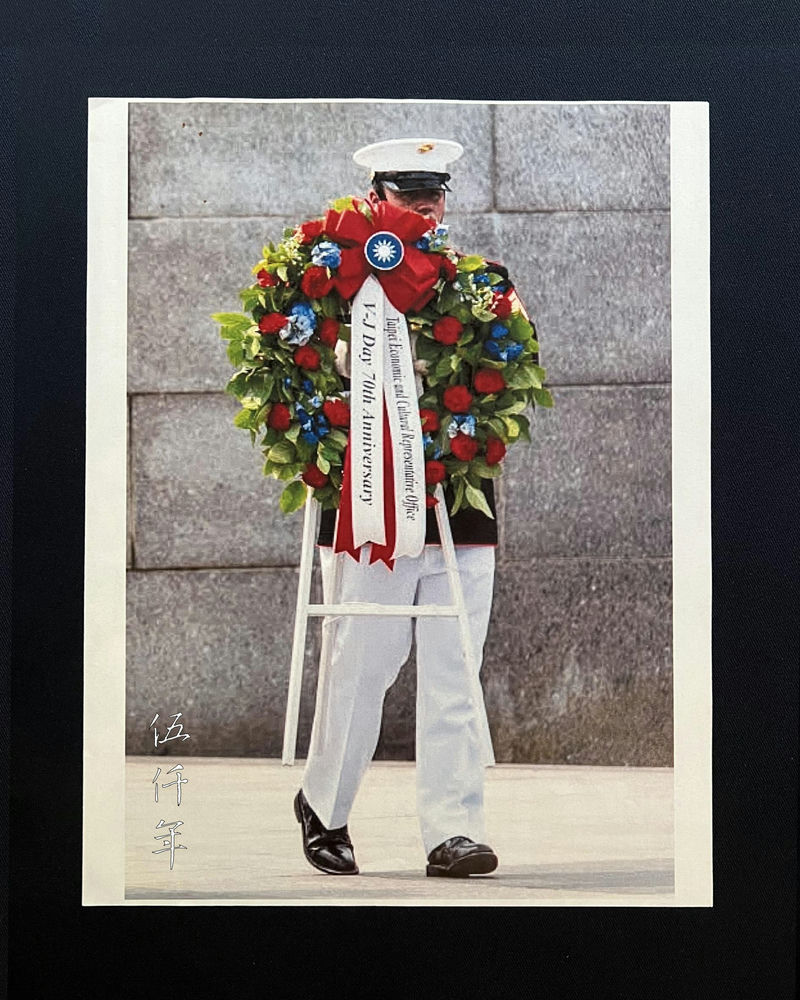
Ambassador Shen Lyu-shun gave this photograph of the wreath decorated with the National Emblem of the Republic of China to Soong Shu Kong
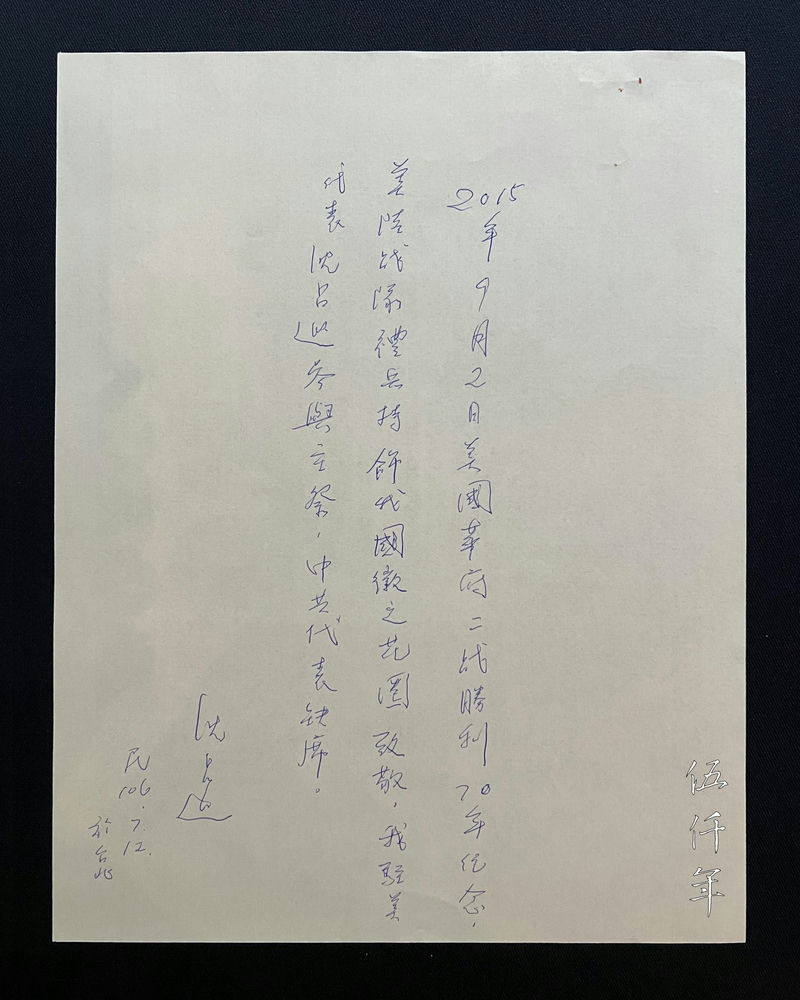
Ambassador Shen Lyu-shun inscribed the back of the photograph
I have a photograph given by Ambassador Shen of the wreath offered by the Republic of China at the Commemoration of the 70th Victory Anniversary of the Second World War in Washington in the 104th year of the Republic (2015). The National Emblem of Blue Sky and White Sun rested solidly and radiantly on the wreath. On the back of the photograph, he inscribed the following words:
“On 2 September 2015 at the Commemoration of the 70th Victory Anniversary of the Second World War in Washington, the Colour Guard of the United States Marine Corps held the wreath decorated with the National Emblem from our country for homage. I, Shen Lyu-shun, representative of the Republic of China participated in the wreath laying. The Chinese communist representative was absent.
Shen Lyu-shun,
12 July in the 106th year of the Republic (2017),
Taipei.”
I reverently treasure this photograph as much as an archaic jade disc.
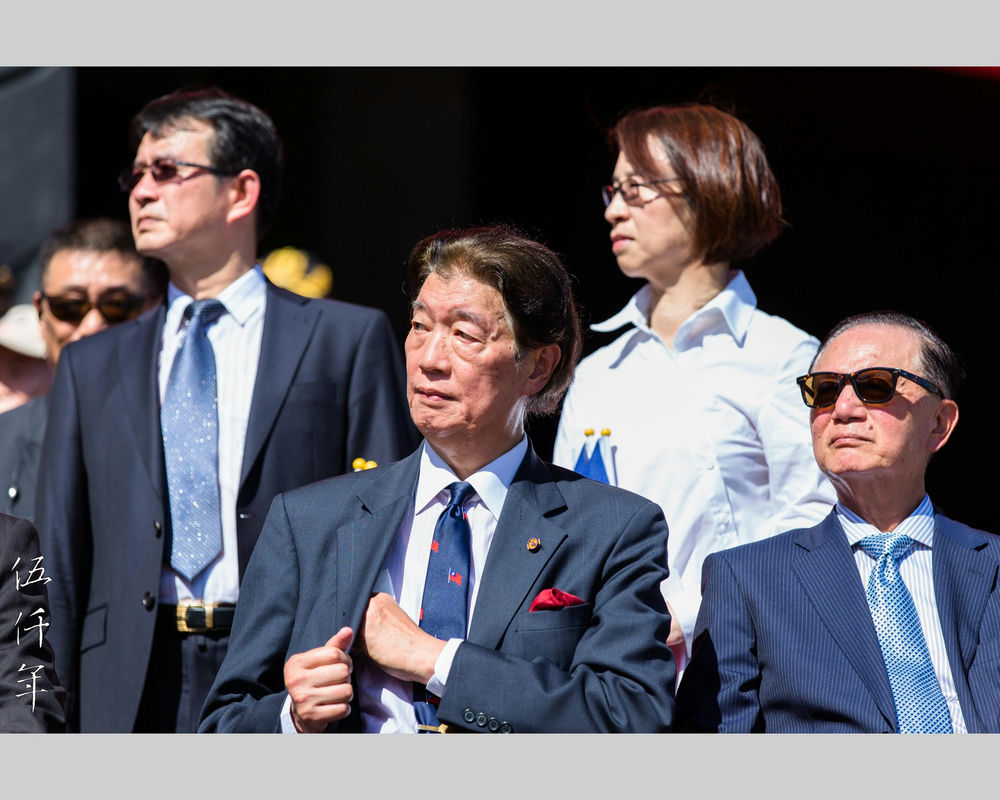
Ambassador Shen Lyu-shun (front left), Ambassador Wu Yüan -yen (烏元彥大使 front right), Mr. and Mrs. Mao Zuo-i (back) at the National Day Celebration of Flag and Country on 10 October in the 106th year of the Republic (2017)
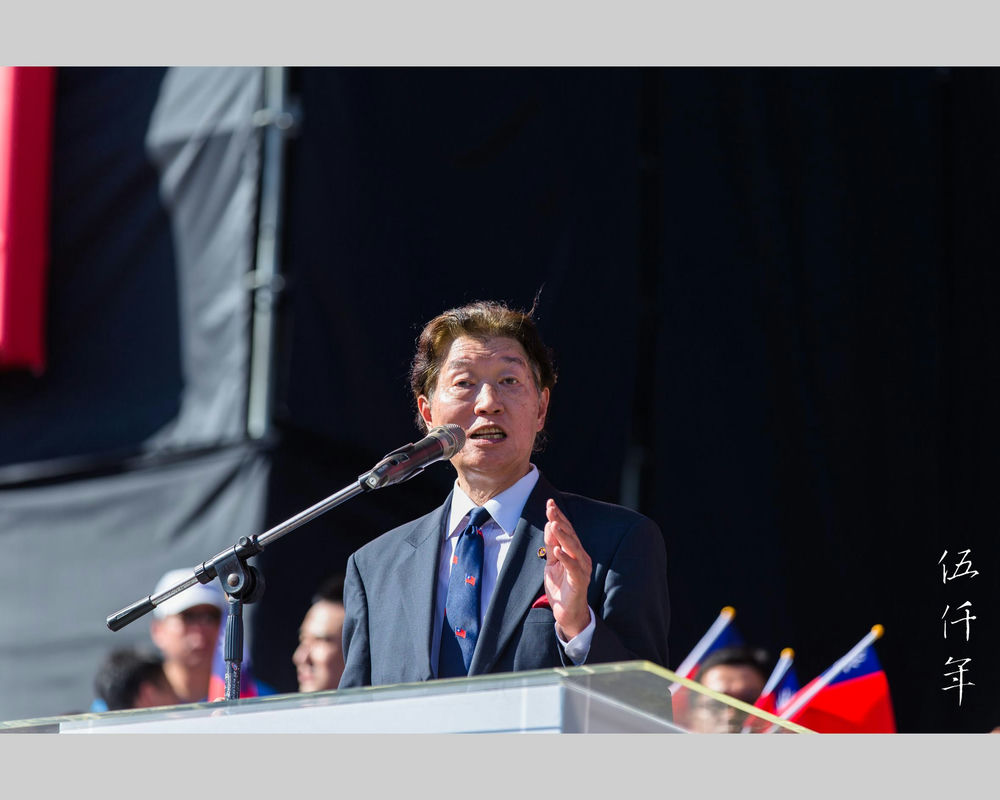
Ambassador Shen Lyu-shun delivering a speech at the National Day Celebration of Flag and Country on 10 October in the 106th year of the Republic (2017)
Since the Commemoration of the 80th Anniversary of the Marco Polo Bridge Incident and the War of Resistance Against Japanese Aggression in the 106th year of the Republic (2017), I gradually saw Ambassador Shen more frequently. On 10th October in the same year, Sung Tao Society was the chief organizer of the National Day Celebration of Flag and Country, and Ambassador Shen was again invited to speak. Although his speech lasted only three minutes, it was succinct, polished, and elegant. When he recounted how after the severance of political relationship between the Republic of China and the United States for thirty eight years, he managed to hoist the National Flag of the Republic of China on the grounds of Twin Oaks in Washington (the official address of the Taipei Economic and Cultural Office in the United States) once more, the audience erupted into exuberant applause.
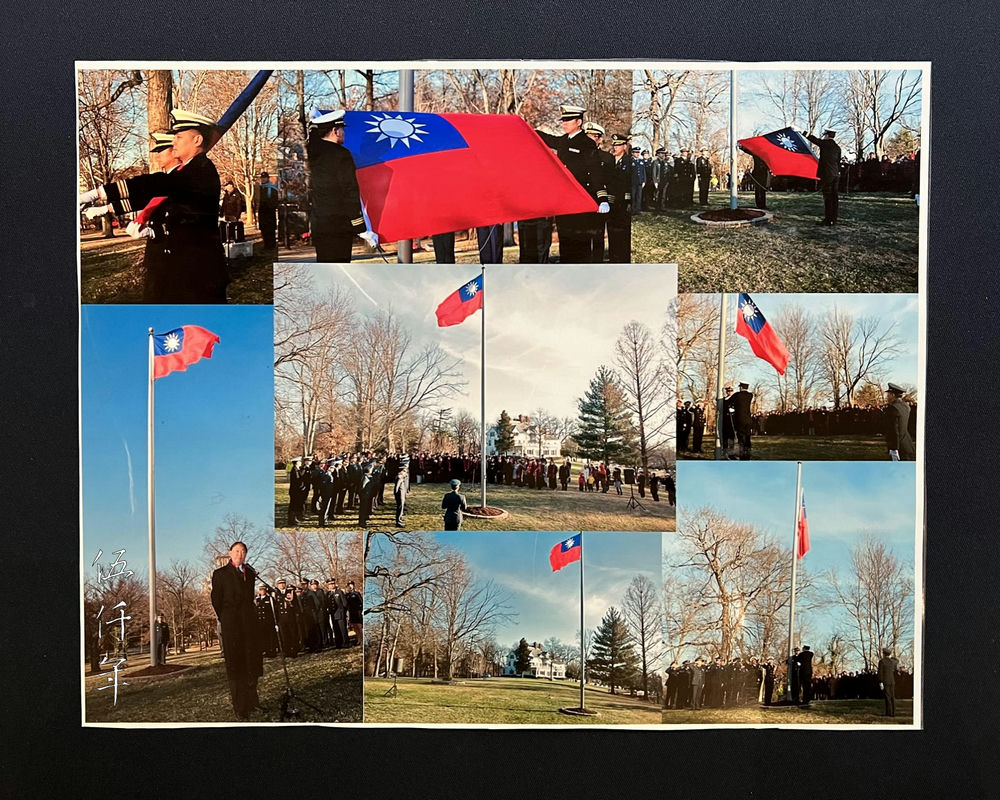
On 1 January in the 104th year of the Republic (2015), Ambassador Shen Lyu-shun managed to hoist the National Flag of the Republic of China on the grounds of Twin Oaks in Washington, the first time in thirty eight years after the severance of political relationship between the Republic of China and the United States. Ambassador Shen gave these photographs taken on the day to Soong Shu Kong
On 4th May in the following year, Sung Tao Society organized the Commemoration of Fu Ssu-nien and the 99th Anniversary of the May Fourth Movement, Ambassador Shen was not only delighted to attend, after the event, he immediately hurried over to attend the opening ceremony of the Commemoration Exhibition of the 99th Anniversary of the May Fourth Movement and delivered a special lecture. The title was Homage to the 100th Anniversary of the May Fourth Movement: Remembering the Legacies of Past Diplomats. Ambassador Shen spoke for thirty three minutes, recalling with eloquence the undisclosed stories of Chinese diplomacy during the Paris Peace Conference and the anecdotes of the Chinese delegates, which made up for the shortcomings of existing historical chronicles. His unique ability to use his decades long experience and training of a diplomat to explain the historical events in diplomacy was unmatched. His speech flowed like shifting clouds and running water, the topics interlocked in succession, without a moment of stalling nor slowing. The address was made in one continuous delivery from beginning to end. Orators have always been rare since ancient times. Ambassador Shen was a worthy luminary in oratory to rival his predecessor Anson Burlingame at the two ends of the time spectrum.
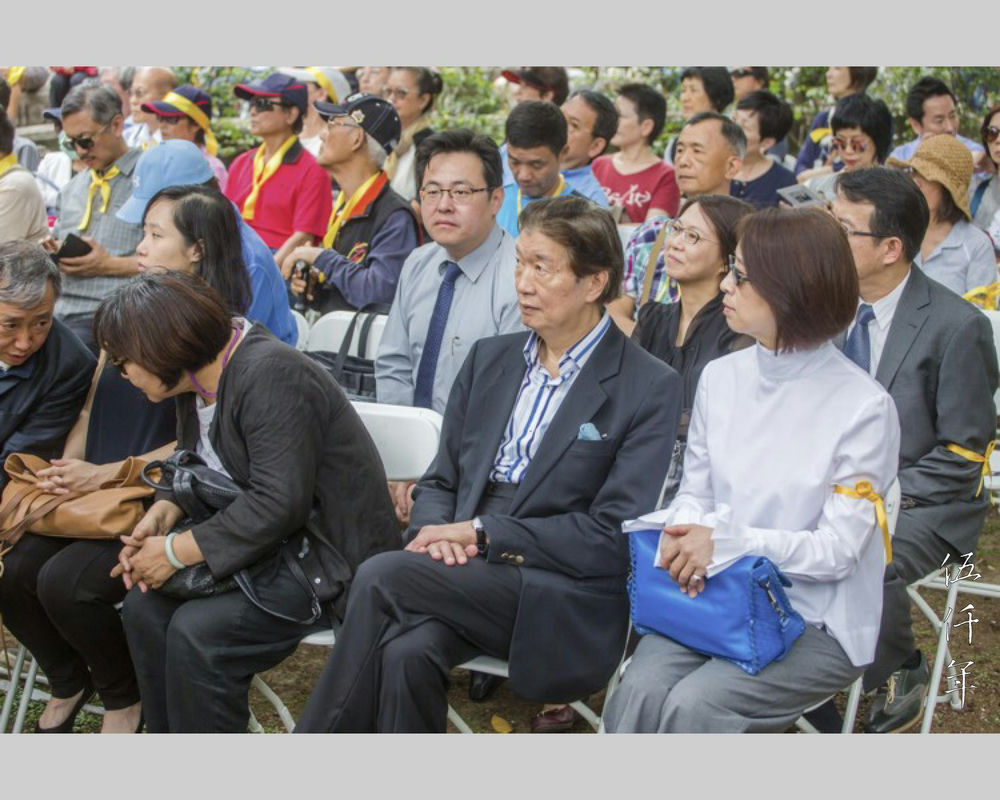
Ambassador Shen Lyu-shun and Mrs. Mao Zuo-i (right) at the Commemoration of Fu Ssu-nien and the 99th Anniversary of the May Fourth Movement on 4 May in the 107th year of the Republic (2018)
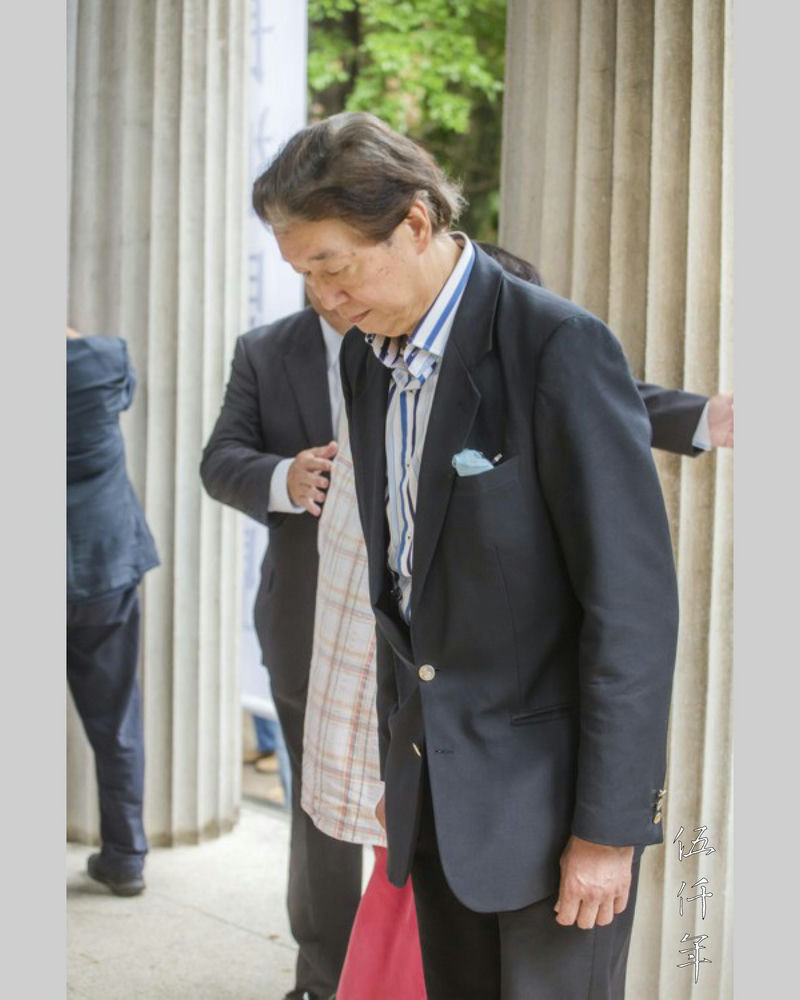
Ambassador Shen Lyu-shun paying respect in front of the tomb of Fu Ssu-nien at the Commemoration of Fu Ssu-nien and the 99th Anniversary of the May Fourth Movement
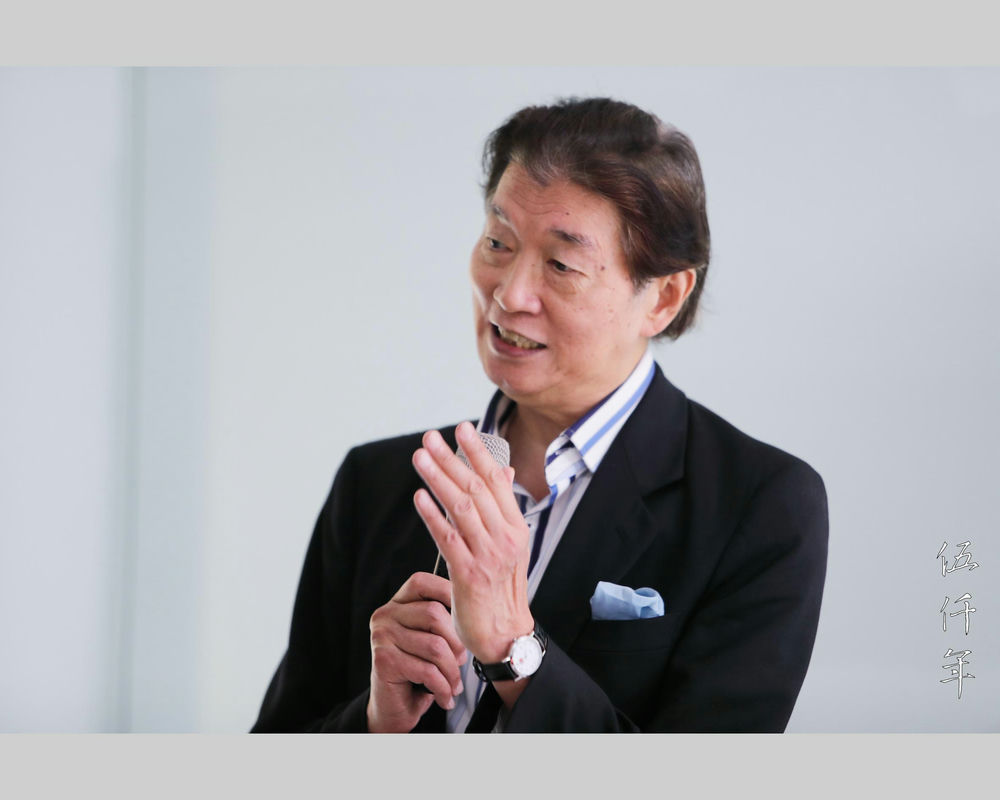
Ambassador Shen Lyu-shun delivering a special lecture at the opening ceremony of the Commemoration Exhibition of the 99th Anniversary of the May Fourth Movement on 4 May in the 107th year of the Republic (2018)
The speeches made by Ambassador Shen at the Commemoration of the 80th Anniversary of the Marco Polo Bridge Incident and the War of Resistance Against Japanese Aggression, the National Day Celebration of Flag and Country in the 106th year of the Republic (2017), and Homage to the 100th Anniversary of the May Fourth Movement: Remembering the Legacies of Past Diplomats are all now available on the internet. His image and voice are of course for all to pay tribute, but one especially hopes that future generations will be inspired not to abandon the reconstruction of China. The text of the speech Homage to the 100th Anniversary of the May Fourth Movement: Remembering the Legacies of Past Diplomats was compiled in the book The Struggle to Reverse Destiny-Commemoration of the 100th Anniversary of the May Fourth Movement, published in the 108th year of the Republic (2019). It was no less than a tribute from Free China to the 100th Anniversary of the May Fourth Movement.
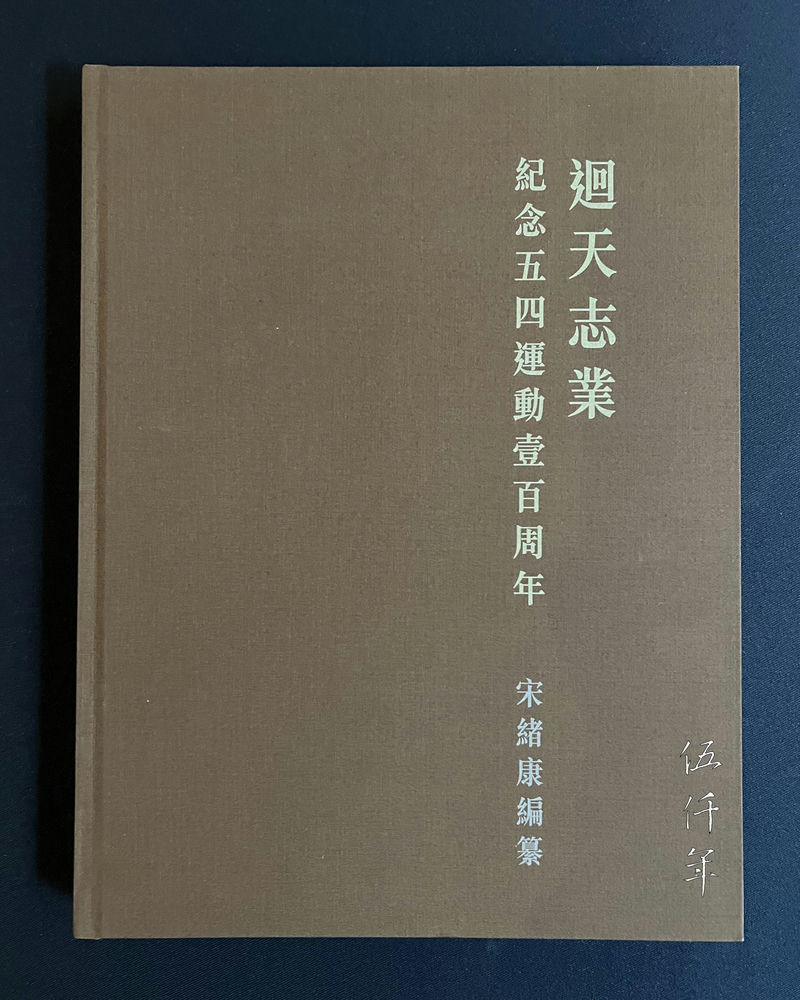
Front cover of The Struggle to Reverse Destiny-Commemoration of the 100th Anniversary of the May Fourth Movement
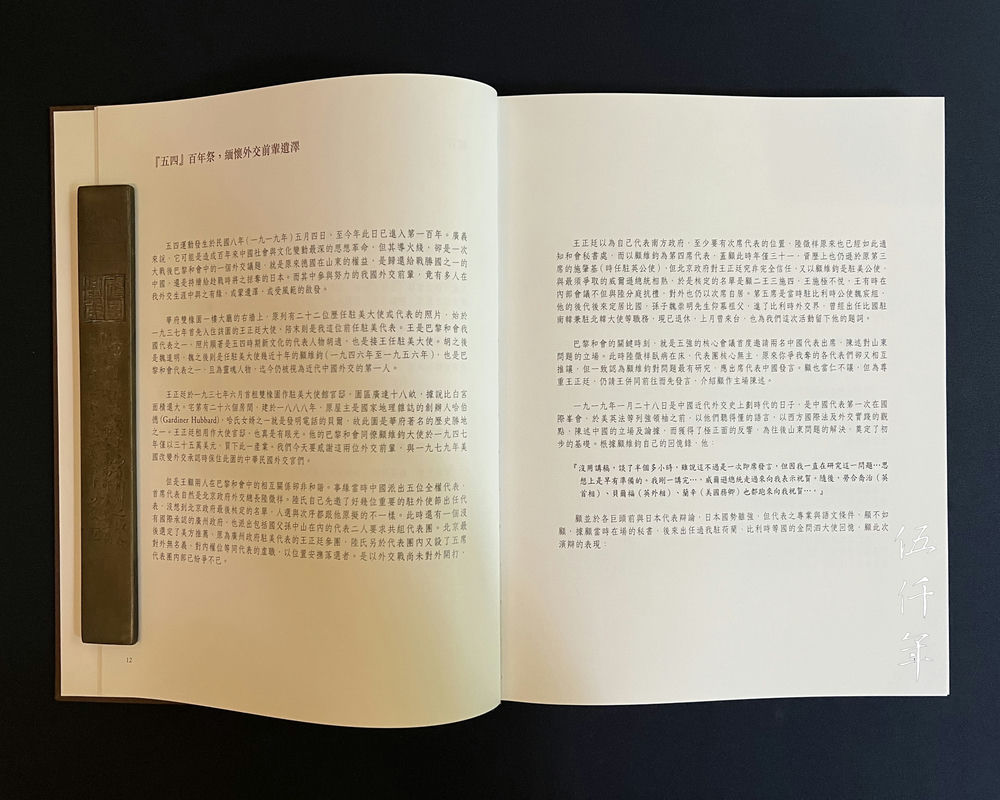
Homage to the 100th Anniversary of the May Fourth Movement: Remembering the Legacies of Past Diplomats was compiled in the book The Struggle to Reverse Destiny-Commemoration of the 100th Anniversary of the May Fourth Movement
Before the opening ceremony of the Commemoration Exhibition of the 99th Anniversary of the May Fourth Movement, Ambassador Shen had originally wished to invite Ambassador Victor Wei of Belgium to attend. Ambassador Victor Wei happened to be traveling in Taipei in April. One evening, Ambassador Shen invited myself and Ambassador Wei to dinner. Ambassador Wei is the former Belgian ambassador to Korea. His grandfather Wei Ch’en-tsu (魏宸祖 1885-1942) was one of the five delegates from China at the Paris Peace Conference in the 8th year of the Republic (1919). Wei Ch’en-tsu was the Chinese minister to Belgium at the time, his descendants became citizens of Belgium, and his grandson followed his professional footsteps. The mother of Ambassador Victor Wei was Chiang Hua (蔣華女士), the daughter of the eminent military strategist Chiang Fang-chen (蔣方震 1882-1938). That evening I brought along twenty letters by Chiang Fang-chen in my family collection as conversation pieces. Unfortunately Ambassador Wei had already fixed his return date and could not attend the opening ceremony. Ambassador Shen then asked Ambassador Wei to inscribe some words to enhance the appeal of the exhibition later. One morning a few days later, I visited Ambassador Wei at his hotel. I presented him with paper and pen, and soon I received a sheet of inscription. The words read:
“As a retired Belgian diplomat and grandson of one of the Chinese Representatives to the 1919 Peace Conference in Paris, I cannot fail to applaud the commemoration of the May Fourth Movement.
Sparked by the refusal of the Allied Powers to use self-determination for solving the Shantung question, this far reaching movement has largely been forgotten.
If the idea of remembering has my full support, I cannot judge its implementation here, having not seen any of the items present. Moreover my opinion does not engage my government.
Victor Wei, Honorary Ambassador of Belgium. 25 April 2018.”
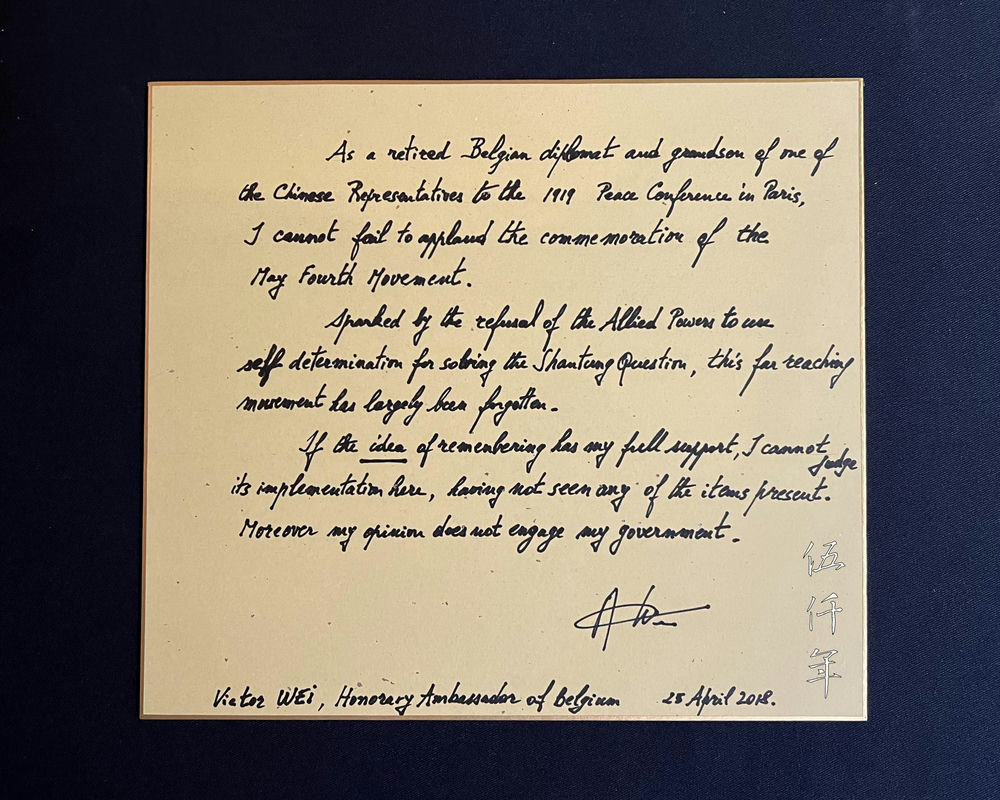
Epigraph handwritten by Ambassador Victor Wei for the Commemoration Exhibition of the 99th Anniversary of the May Fourth Movement on 4 May in the 107th year of the Republic (2018)
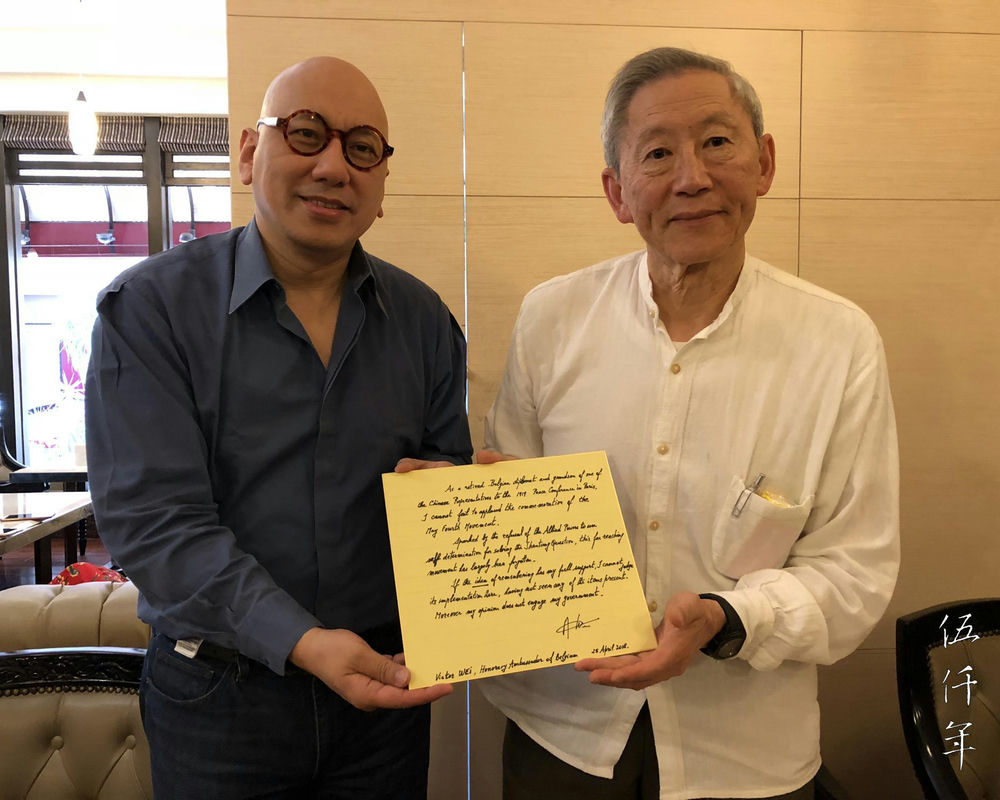
Ambassador Victor Wei (right) presenting the handwritten epigraph to Soong Shu Kong (left)
The inscription by Ambassador Victor Wei was placed in the exhibition and printed in the book, as a means to lead people today to revisit the Paris Peace Conference. Ambassador Shen generously offered his assistance with this purpose in mind. There is an ancient saying: Crying disconsolately while reading the poem Li-sao (離騷) by Ch’ü Yüan (屈原 339-278 BC). I fear modern Chinese history brings so much sorrow that tears can fill rivers and seas. In the context of the Paris Peace Conference, later generations are yet to be freed from the lingering pain caused by the peremptory behavior of the Great Powers, and the despair and perseverance of our forefathers. The road of the Republic of China is tortuous and hazardous. Ambassador Shen understood this well, having handled diplomacy for decades. Hence he studied history thoroughly, and acquired a rigorous understanding of cause and effect, success and failure, perhaps in order to discover an exit from such immense difficulties. I suspect this was the reason he engaged his talents in historical studies. In his speech he mentioned that he had read the correspondence archives between the Chinese Delegation to the Paris Peace Conference and the Government in Peking, and only then did he realize that Chinese citizens sent nearly seven thousand telegrams in all to the Delegation, urging them not to sign the Treaty of Versailles. Ambassador Shen’s scholarship was both expansive in scope and meticulous in detail.
To be brimming with historical knowledge is basically an affair of personal learning, yet in diplomacy this can occasionally achieve vital accomplishments. Ambassador Shen once described the deeds of Lou Tseng-tsiang, foreign minister and chief delegate to the Paris Peace Conference, to an eminent Belgian politician who was captivated by the story. It is not known who this politician is, as Ambassador Shen did not reveal the name. I hypothesize that he is likely to be Count Herman Van Rompuy, whose own lineage prompted his interest in history. In the 97th year of the Republic (2008), while Ambassador Shen was the representative of the Taipei Representative Office in the European Union and Belgium, Count Van Rompuy was the prime minister of Belgium. From 2009 to 2014, Count Van Rompuy was the president of the European Council. Lou Tseng-tsiang is now generally regarded as the first foreign minister of the Republic of China. There was originally a predecessor, Wang Chung-hui (王寵惠 1881-1958), foreign minister to the southern government led by Dr. Sun Yat-sen (國父孫中山先生 1866-1925). However, the government only lasted three month, for the position of provisional president was succeeded by Yüan Shih-k’ai (袁世凱 1859-1916). The career and accomplishments of Lou Tseng-tsiang are illustrious and remarkable. In his later years, he relinquished the secular world and entered a monastery in Belgium. Here is an outline of his deeds:
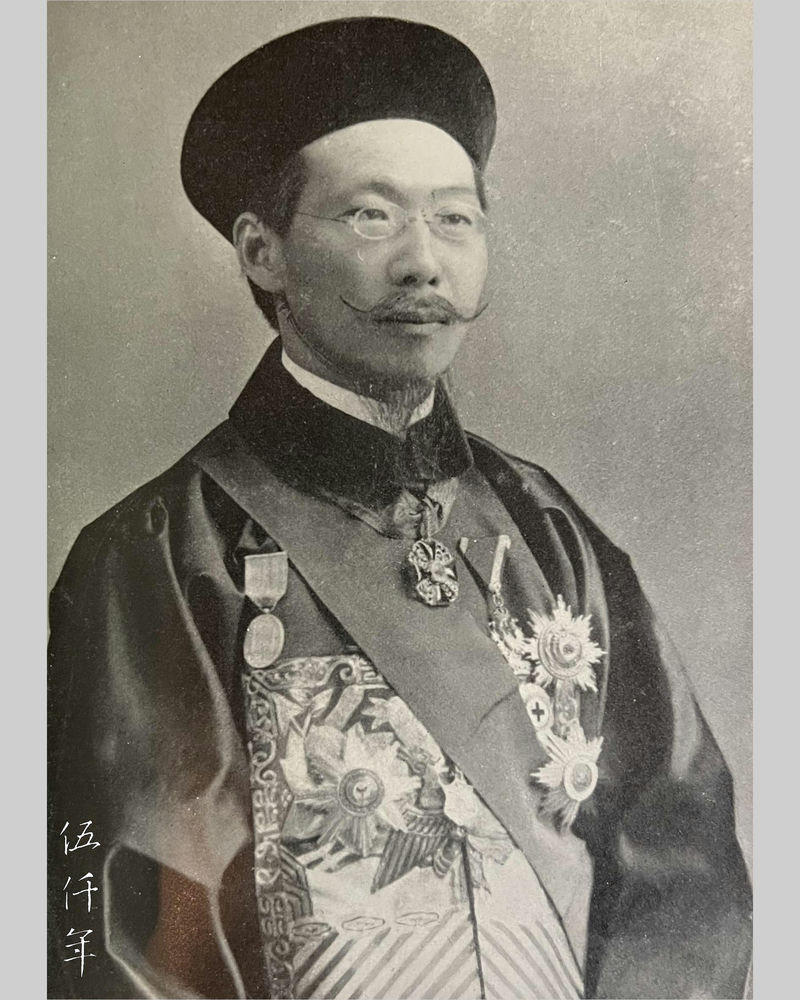
Portrait of Lou Tseng-tsiang
“Lou Tseng-tsiang (1871-1949), tzu Tzu-hsin (子欣), Tzu-hsing (子興), native of Shanghai, Kiangsu Province. His father Ch’eng-an (誠安), tzu Yün-feng (雲峰), was a Christian missionary, hence Lou Tseng-tsiang was baptized as a Christian. In the 10th year of the Kuang-hsü reign (1884) he enrolled in the School of Foreign Languages in Shanghai to study French. In the 17th year of the Kuang-hsü reign (1891) he enrolled in Tong Wen College. In the 19th year of the Kuang-hsü reign (1893) he was an interpreter at the Chinese Legation at St. Petersburg in Russia. He stayed there for fourteen years and left in the 32nd year of the Kuang-hsü reign (1906). He was commended by Hsü Ching-ch’eng, envoy to Russia. Their teacher and student friendship lasted five years, until Hsü was executed by Empress Dowager Tz’u-hsi (慈禧太后) for his opposition against the Boxers in the 26th year of the Kuang-hsü reign (1900). In the 25th year of the Kuang-hsü reign (1899) he married Berthe Bovy, daughter of a Belgian major and a Catholic who was senior by sixteen years. At that time interracial marriage was rare, but they were very much in love till the end. In the 32nd year of the Kuang-hsü reign (1906) he was minister plenipotentiary of the Legation in The Hague. In the following year he was appointed ambassador to the Second International Peace Conference in The Hague. In the 3rd year of the Hsuan-t’ung reign (1911) he was minister of the Legation in St. Petersburg and later converted to the Catholic faith. The Wu-ch’ang Uprising broke out on 10 October, on 31st December he telegraphed the Emperor and urged him to abdicate. In March in the 1st year of the Republic (1912), he was appointed minister of the Department of Foreign Affairs, in June he was appointed prime minister, and in September he returned as minister of the Department of Foreign Affairs. In the 8th year of the Republic he was appointed chief delegate of the Chinese Delegation to the Paris Peace Conference, whereby the Chinese Delegation refused to sign the Treaty of Versailles. In the 11th year of the Republic (1922) the health of Madame Lou deteriorated, they moved to Switzerland for her recovery, and he became minister of the Legation in Switzerland. In April in the 15th year of the Republic (1926) Madame Lou passed away. He was heart-broken. In July in the following year, he entered the Abbey of Saint-Andre, a Catholic Benedictine abbey at Bruges in Belgium as a Novitiate. In the 24th year of the Republic (1935) he was ordained to priesthood. In the 35th year of the Republic (1946) His Holiness Pope Pius XII conferred on him the title of Saint-Pierre of Ghent. He wrote Souvenirs et Pensees.”
After Madame Lou passed away, Lou Tseng-tsiang became a Benedictine monk in her home town of Bruges. He kept her company in life and in death, their story the envy of romantics. The eminent Belgian politician was fascinated by this story, and developed goodwill towards the distant Republic of China, faraway in the east.
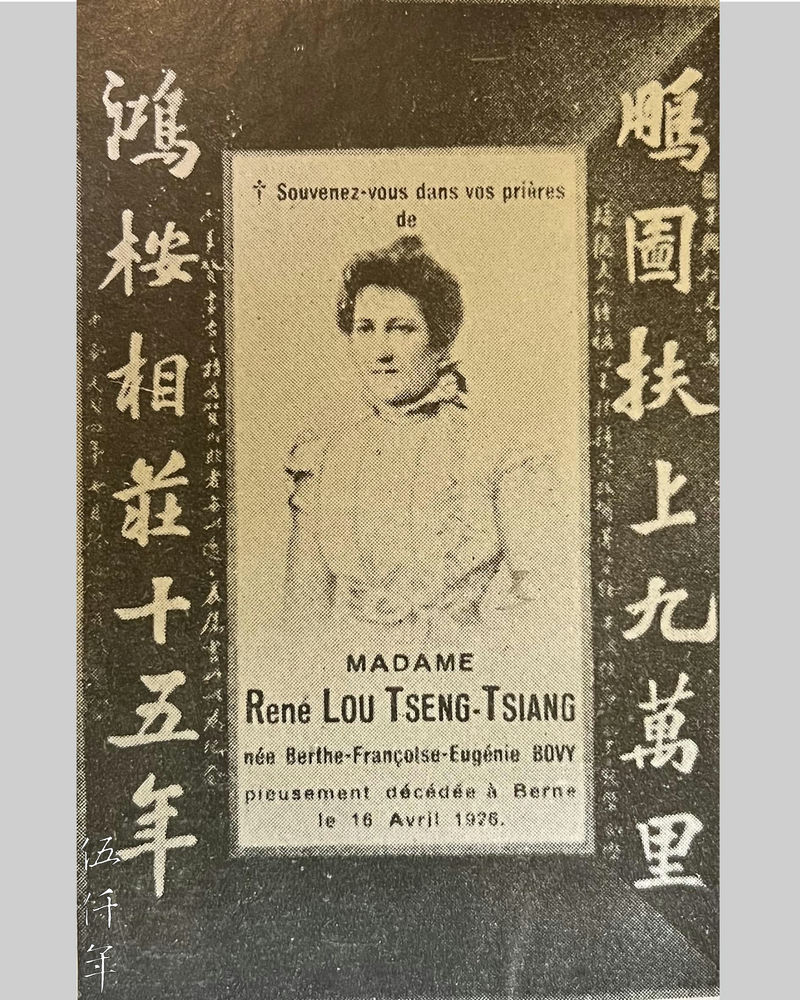
Portrait of Berthe Bovy, wife of Lou Tseng-tsiang
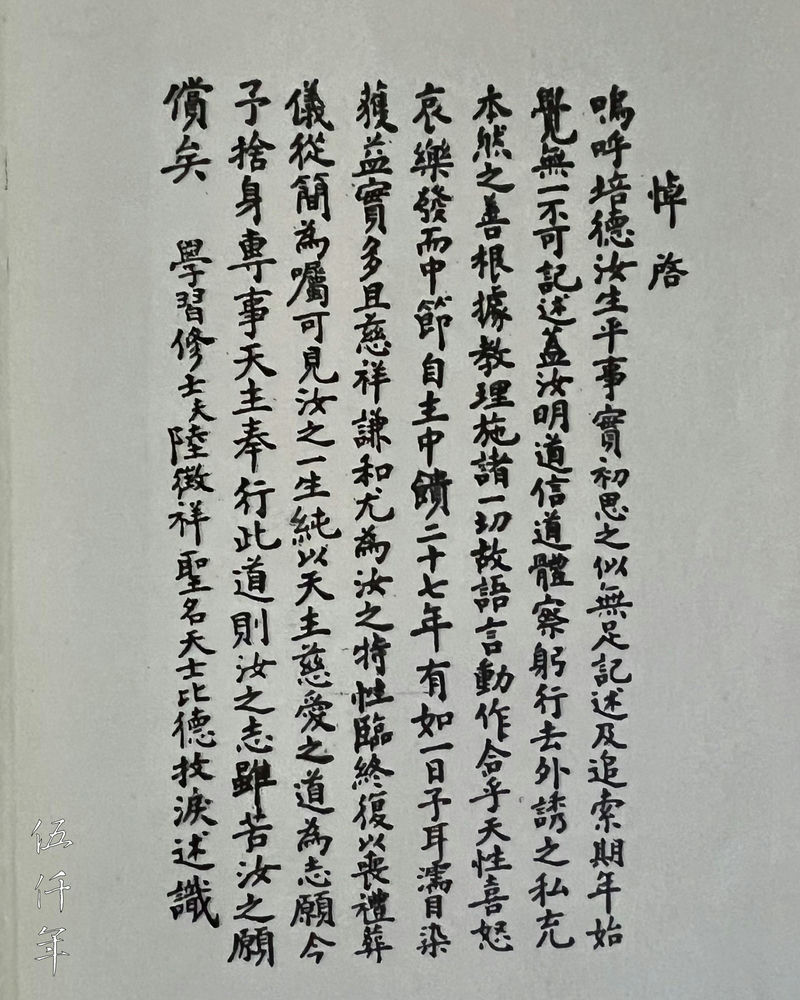
In Memoriam Berthe Bovy by Lou Tseng-tsiang
Sometime later Ambassador Shen was instructed to secure visa-free entry to European countries for Chinese nationals holding Republic of China passports. The eminent Belgian politician was then in an influential position at the European Council, and he was happy to offer his assistance. In a short period of over a year, on 11th January of the 100 th year of the Republic (2011), thirty six European countries agreed to permit Chinese nationals holding Republic of China passports visa-free entry not exceeding ninety days within a six months period. This was a huge triumph in diplomacy for the Republic of China. The arrival of this opportunity was in fact fostered by the historical knowledge cultivated by Ambassador Shen, who was able to cross time and history, in extending the sanctuary provided by Lou Tseng-tsiang. This is evidence that history is the strongest power of the Republic of China, as well as her rich and magnificent inheritance. Ambassador Shen once gifted me a compact disc produced by the Ministry of Foreign Affairs in the 100th year anniversary of the founding of the Republic of China, titled Building Bridges to the World: Lou Tseng-tsiang, the Republic of China’s First Foreign Minister. The compact disc is probably hard to come by nowadays.
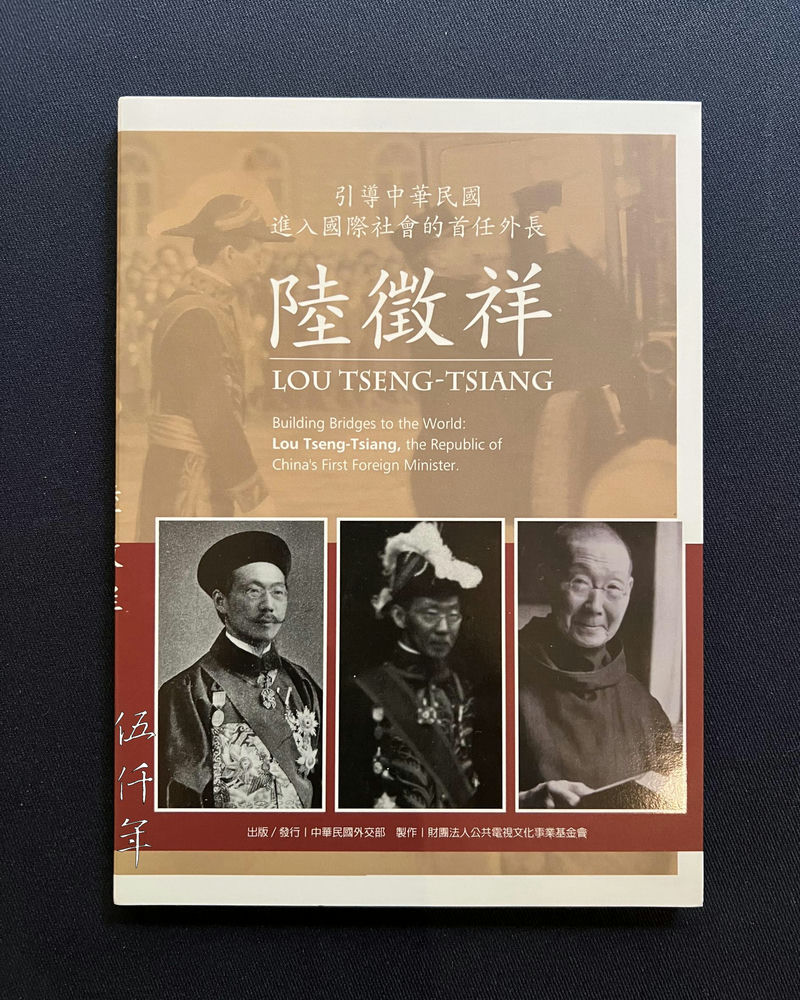
Sleeve cover of the CD produced by the Ministry of Foreign Affairs titled Building Bridges to the World: Lou Tseng-tsiang, the Republic of China’s First Foreign Minister
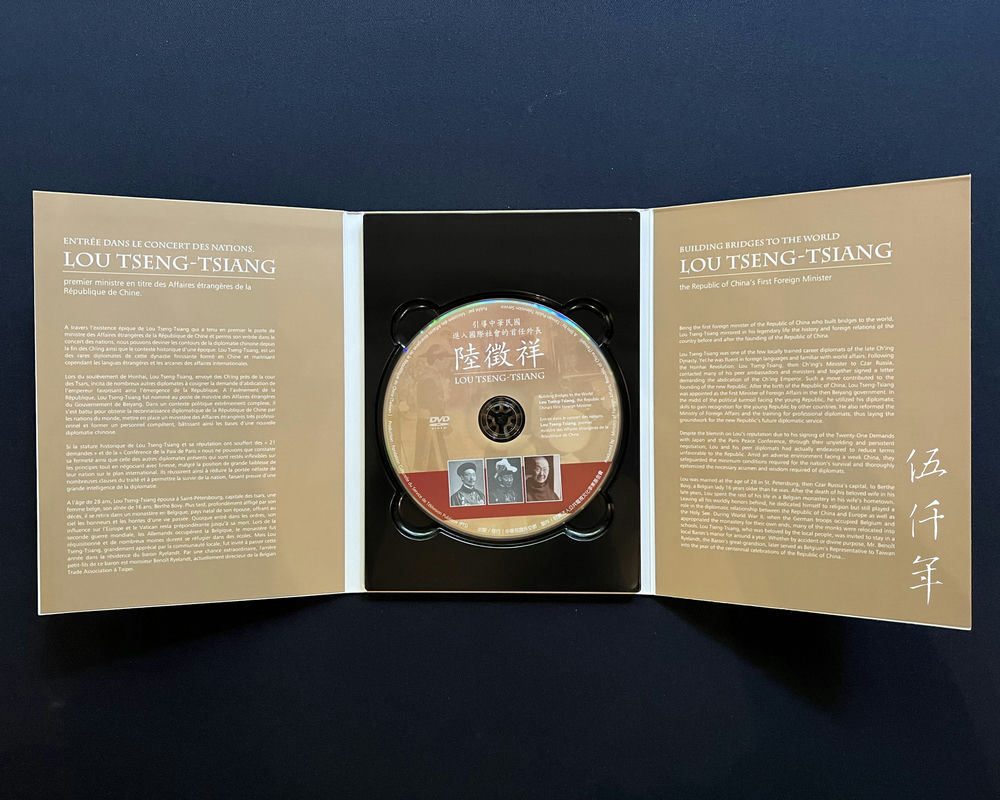
Inner sleeve panels of the CD: Building Bridges to the World: Lou Tseng-tsiang, the Republic of China’s First Foreign Minister
In the 100th year of the Republic (2011), Ambassador Shen was the representative of the Taipei Representative Office in the United Kingdom. Although he was embroiled in national affairs, he did not neglect scholarly pursuits in his leisure. Ambassador Shen discovered and presented me with a copy of Dr. Sun Yat-sen’s admission record to the Reading Room at the British Museum dated 5 December 1896. Dr. Sun Yat-sen filled in different spaces in the record in his own handwritings. They are:
Purpose for which admission is required: Chinese Literature
Name: Sun Yat Sen, Wen
Address: 8 Grays inn Place
Profession or Occupation: Medical man
Date: Dec 5th 1889
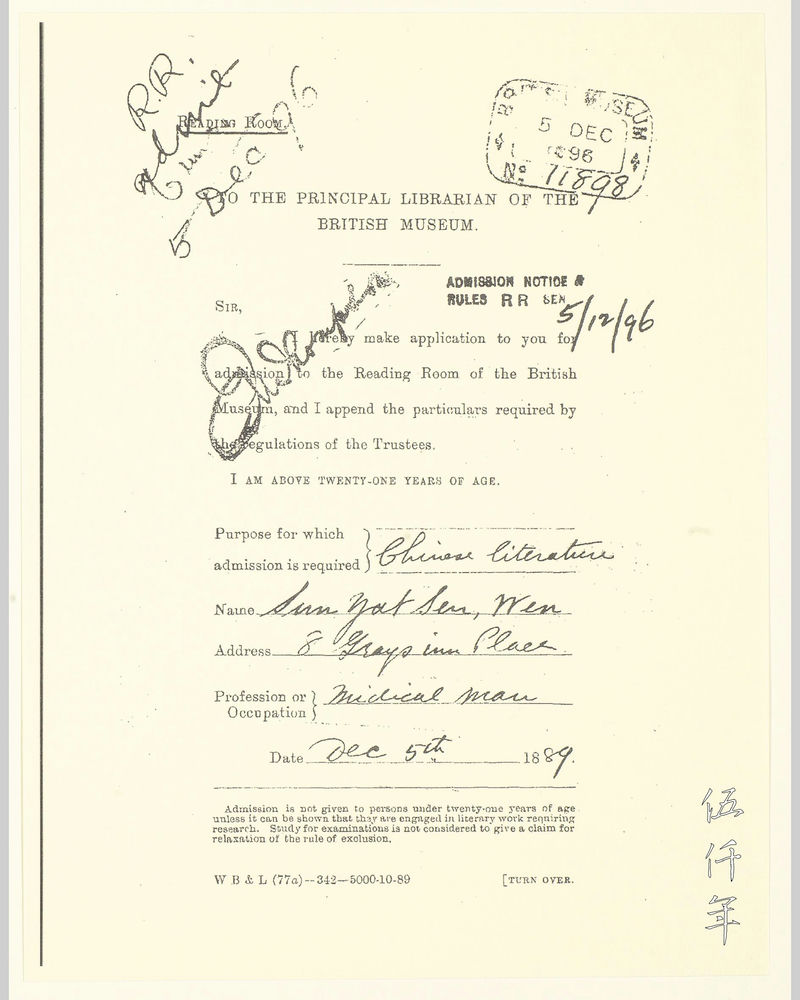
A copy of Dr. Sun Yat-sen’s admission record to the Reading Room of the British Museum dated 5 December 1896
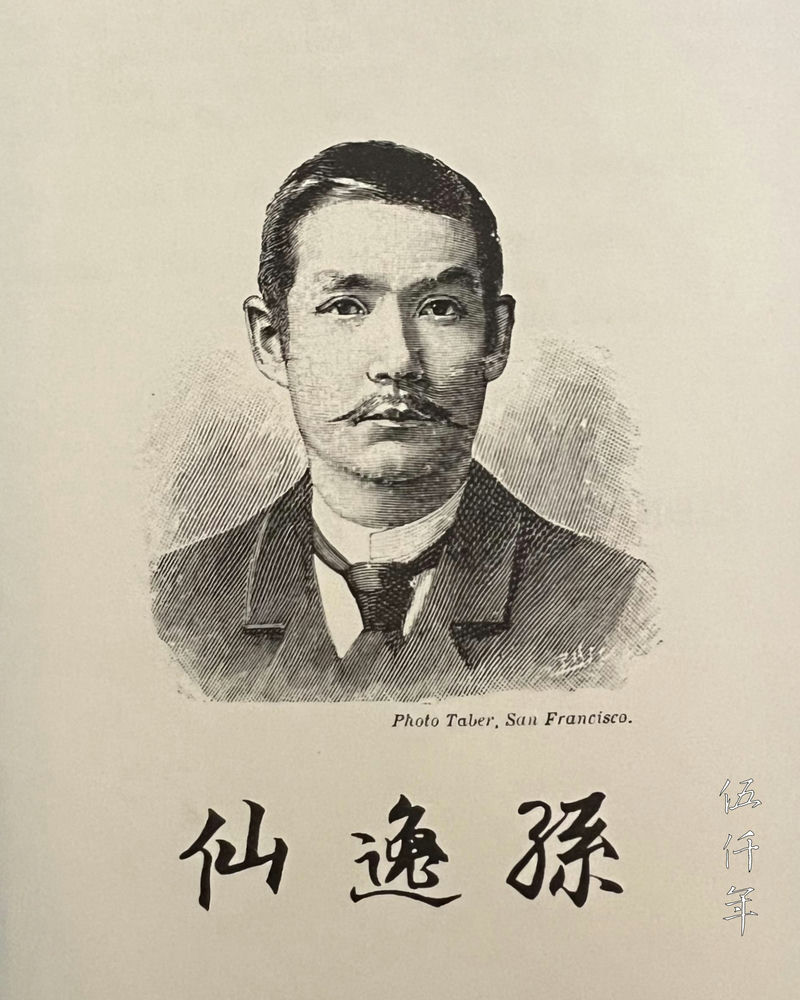
Portrait of Dr. Sun Yat-sen around 1896
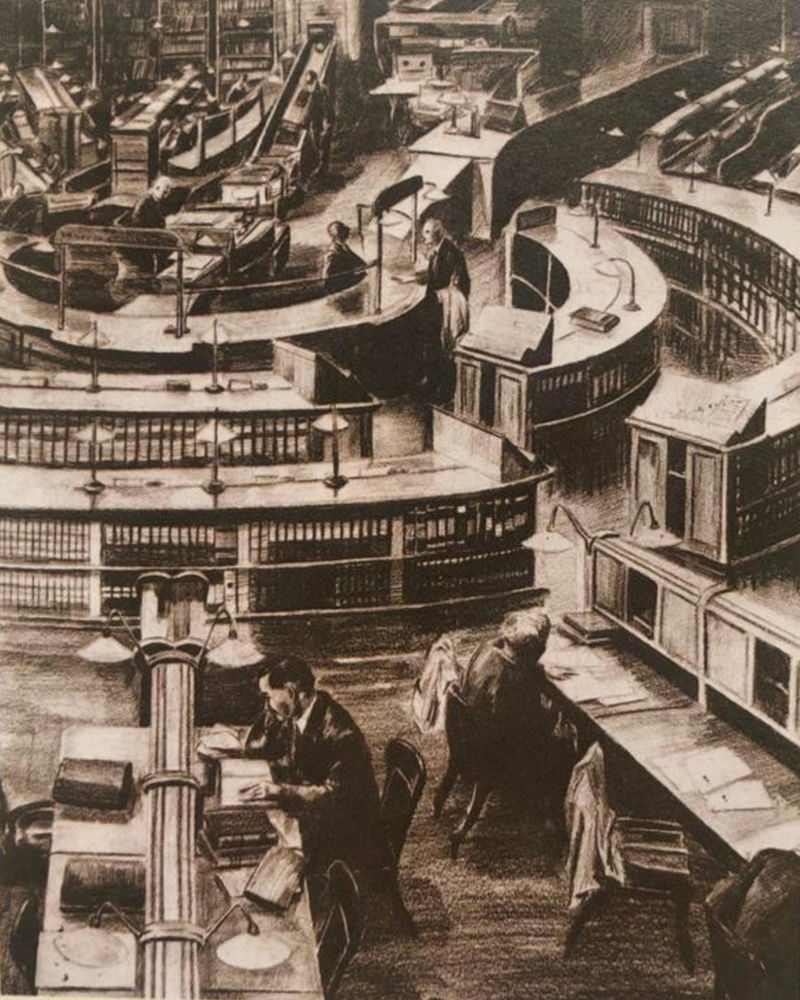
A sketch that depicts Dr. Sun Yat-sen using the Reading Room of the British Museum
The date 5 December 1889 was Dr. Sun Yat-sen’s first admission to the Reading Room. The later admission date of 5 December 1896 was indicated by the stamp on the top right corner, the inscription below the stamp, and the inscription on the top left corner. Between 11 October 1896 and 23 October 1896, Dr. Sun Yat-sen was kidnapped by members of the Ch’ing Legation in London, an episode well known in history. After his release, he frequently visited the Reading Room, and left England the following year.
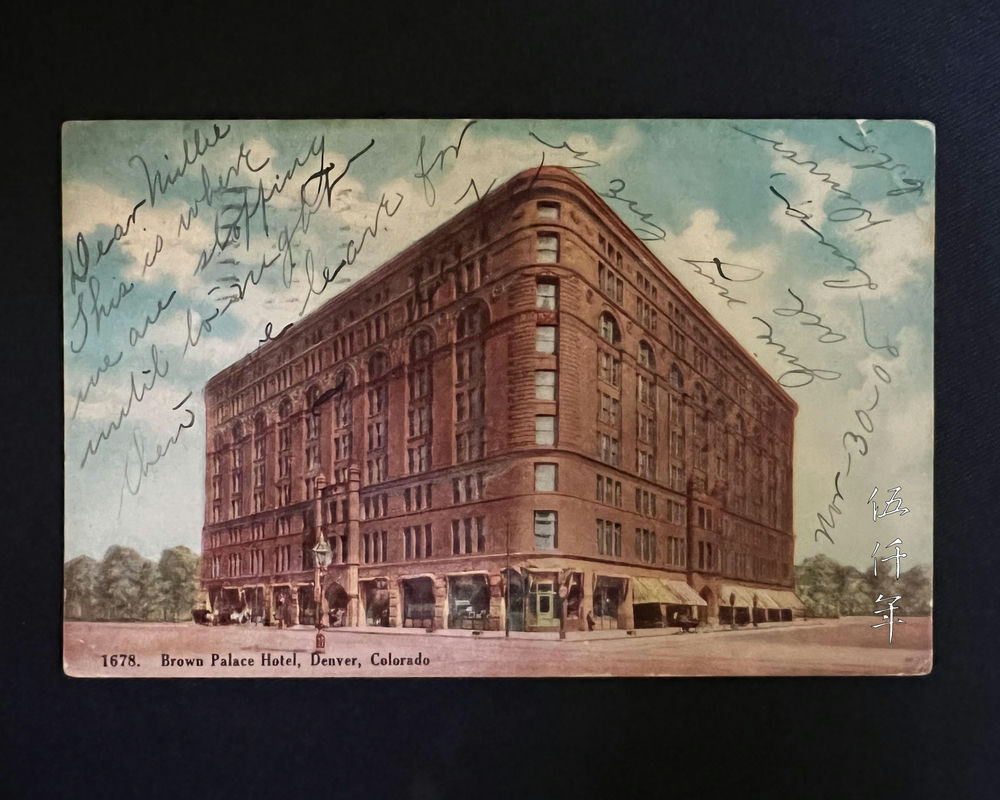
A postcard of Brown Palace Hotel in Denver with postage stamp dated 1908
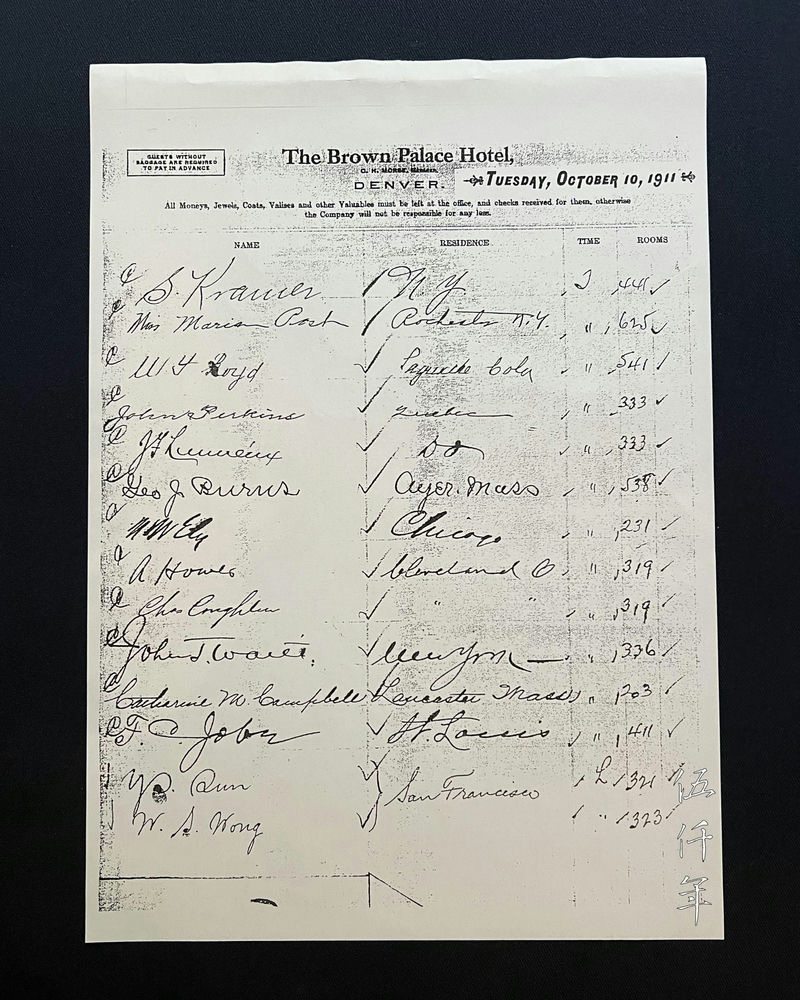
A copy of the register page dated 10 October 1911 from Brown Palace Hotel with Dr. Sun Yat-sen’s signature
In the 103rd year of the Republic (2014), Ambassador Shen was the representative of the Taipei Economic and Cultural Office in the United States. He visited the Brown Palace Hotel in Denver and discovered the register with the signature of Dr. Sun Yat-sen when he checked in on 10 October in 1911. He once presented me with a copy of the register page, Dr. Sun’s signature was the second last name in the left row. On 10th October in the 3 rd year of the Hsuan-t’ung reign (1911) the Wu-ch’ang Uprising broke out in haste. Dr. Sun was still in the United States raising funds for armaments. Many provinces consecutively rose in revolt. On 2 December the combined revolutionary army from Kiangsu and Chekiang Provinces captured Nanking, on 12 December representatives of the fourteen rebel Provinces gathered in Nanking, on 17 December they nominated Li Yüan-hung (黎元洪 1864-1928) as commander-in-chief and Huang Hsin (黃興 1874-1916) as deputy commander-in-chief, on 29 December they elected Dr. Sun Yat-sen as the provisional president. On 1 January in the following year, the Republic of China was founded and Dr. Sun was inaugurated the provisional president.
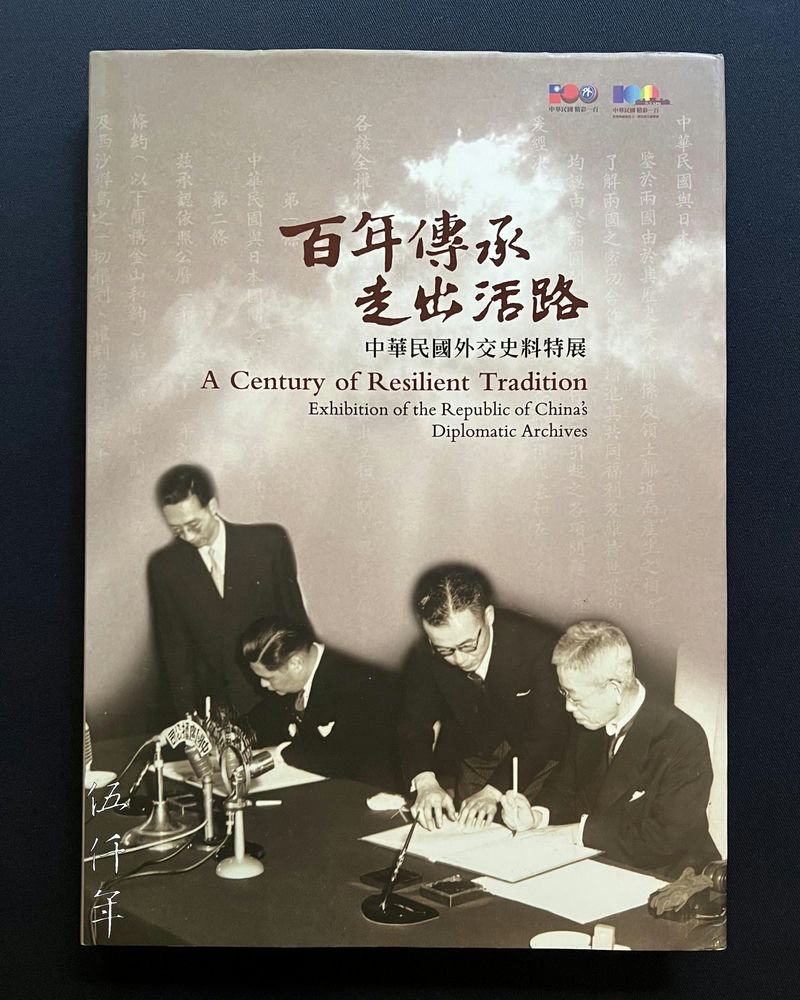
The book cover of A Century of Resilient Tradition, Exhibition of the Republic of China’s Diplomatic Archives compiled by Ambassador Shen Lyu-shun and Ms. Feng Ming-chu
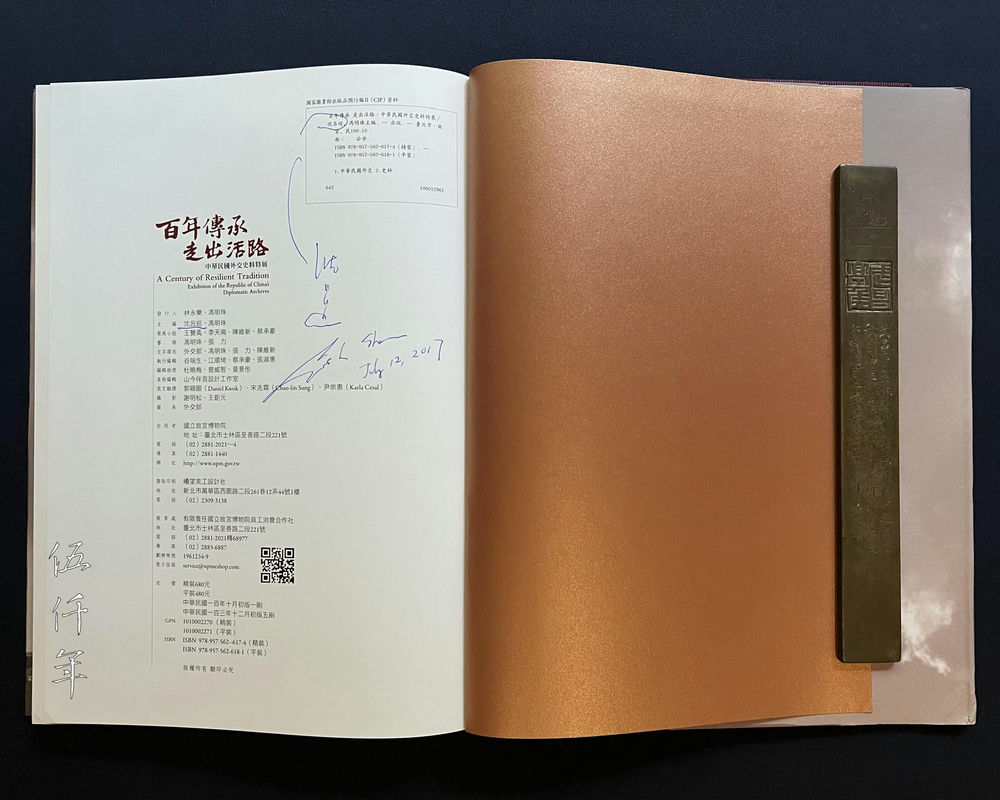
Ambassador Shen Lyu-shun signed the copyright page of the book
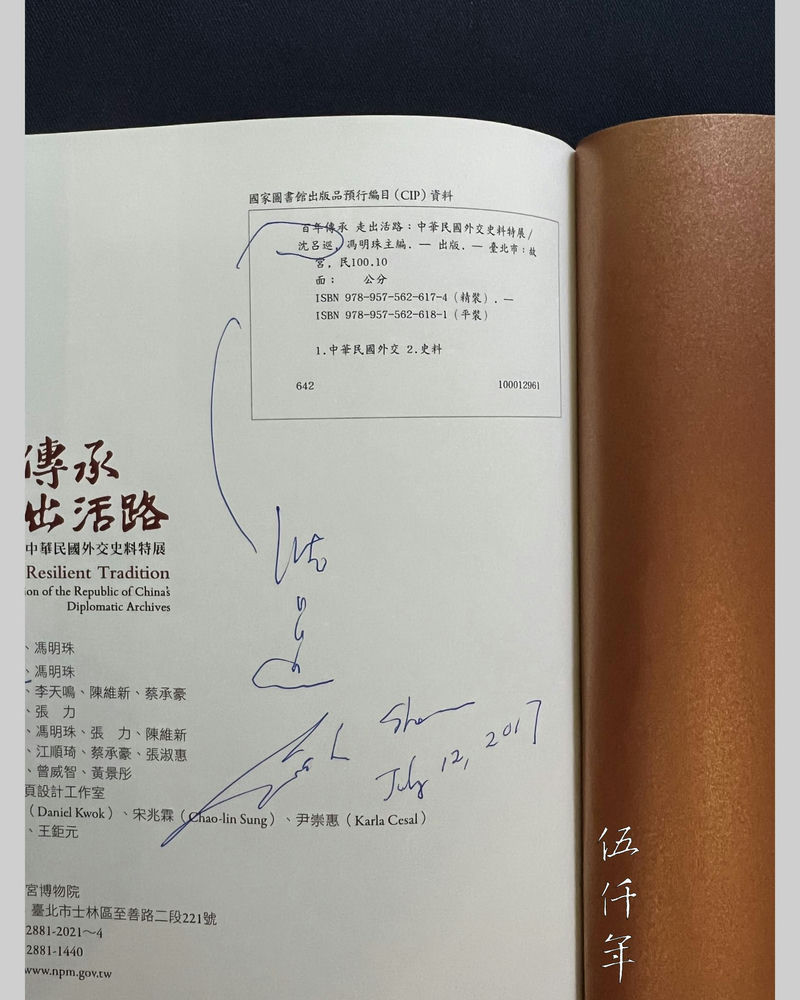
Detail of signature on copyright page
In the 100th year of the Republic (2011), Ambassador Shen and Ms. Feng Ming-chu (馮明珠), the director of the National Palace Museum, compiled the catalogue A Century of Resilient Tradition, Exhibition of the Republic of China’s Diplomatic Archives. Many of the important international treaties of the Ch’ing dynasty and the Republic of China were assembled. The wealth of information is unprecedented. As Ambassador Shen was an expert historian of diplomatic history, it is reasonable to conjecture that he contributed most of the writings. Ambassador Shen gifted me with this book, and signed on the last page as follows :
“沈呂巡
Lyu-shun Shen
July 12 2017”
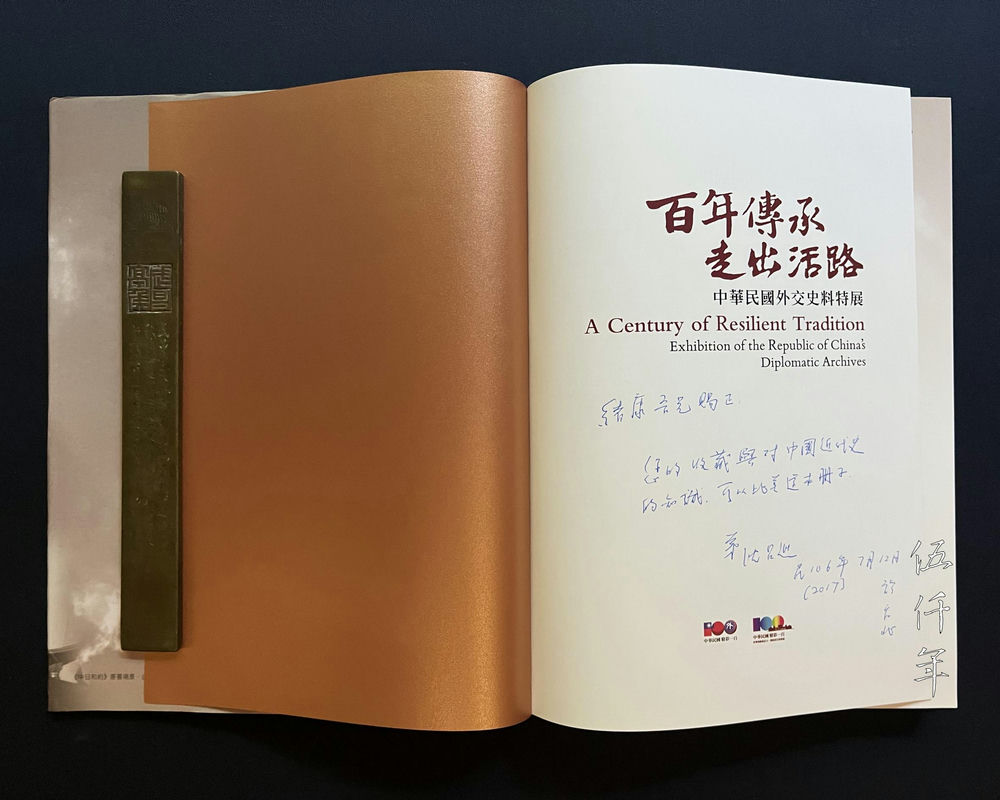
Ambassador Shen Lyu-shun inscribed the title page of the book
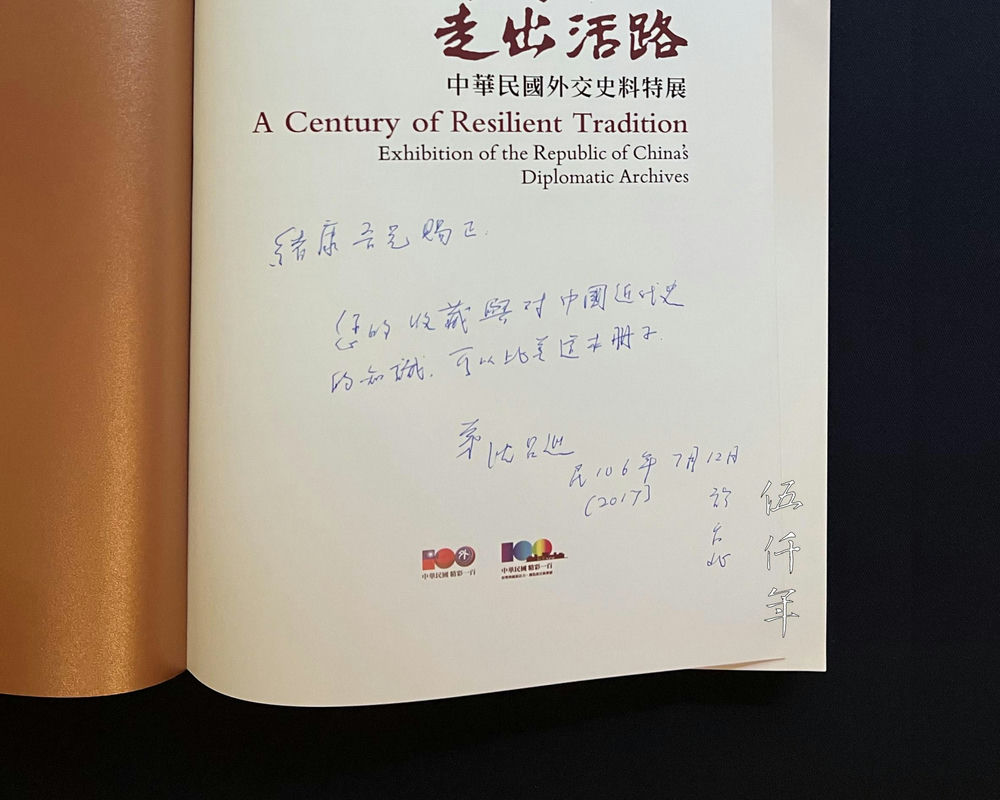
Detail of inscription on title page
On the title page, he inscribed in Chinese:
“For the rectification of my friend Shu Kong:
Your collection and knowledge of modern Chinese history can be compared favorably with this book.
Shen Lyu-shun.
12 July in the 106th year of the Republic (2017),
Taipei.”
I knew Ambassador Shen for seven years, during this time he generously proffered his approbation beyond my worth, for which I am forever grateful.
As Ambassador Shen was a grandson of the sixth generation of Viceroy Shen Pao-chen, the times and events of late Ch’ing would have weighed on him. With the country’s fate hanging by a thread, the call to action to rescue the country and ensure survival indeed became the casual cycle for seven generations of the Shen family. His disposition would have been forged by the trials and tribulations of history. I remember distinctly the day when Ambassador Shen visited me at home. He was stirred and delighted with a pair of calligraphy couplets by Wu K’o-tu (吳可讀 1812-1879) on the wall. I realized that he was extremely knowledgeable about the history of the Ch’ing dynasty. Today in Taiwan, there may be only a few persons who still know about Wu K’o-tu. Wu K’o-tu wrote a memorial to the throne, accusing the Dowager Empresses to have erred in selecting the heir to the throne in the 5th year of the Kuang-hsü reign (1879), for it could only be inherited by the designated heir to the deceased Emperor Mu-tsung (穆宗同治帝). He then took a dose of poison and committed suicide. With his death he compelled the issue to be reconsidered in court. It was a heroic act that shocked the nation, but its moral example aroused a whole generation. Ambassador Shen upheld the comportment of the ancient court officials, and he must have found the life of Wu K’o-tu deeply moving. That day I also showed him some inscribed works by the Occidental scholars W. A. P. Martin and James Legge, all contemporaries of his forefather Shen Pao-chen. I was delighted that they were greatly appreciated by Ambassador Shen, a fellow enthusiast.
In the 108th year of the Republic (2019) Ambassador Shen suffered a stroke. His friends were all worried and distressed. Since it was inappropriate to disturb him while sick, I only made a few short calls on occasion to express concern. Whenever I saw an article of his in the United Daily News, it brought prolonged relief, and I hurried to alert our friends, in order to tell them that his illness had not worsened and the day of his full recovery was in sight. On 7 October in the 110th year of the Republic (2021), Sung Tao Society organized a press conference for the launch of the Chinese-Heritage Virtual Museum, and Ambassador Shen was invited to speak. In testimony of true friendship, he made a great effort to attend even in the middle of his recuperation. During the several years of the pandemic, I dared not arrange to meet nor visit him, yet he was very much in my mind. On 7 January in kuei-mao year (2023), news of his death unexpectedly arrived.
It is known that Ambassador Shen enjoyed practicing diplomatic etiquette at a young age, when his deportment and views were already distinct. Lou Tseng-tsiang also reminisced about his rigorous training in diplomatic etiquette under the tutelage of his teacher Hsü Ching-ch’eng. Perhaps the ambitions and inclinations of Ambassador Shen and Minister Lou had much in common, the former encountered the kindred spirit of the latter in history, and utilized the latter’s legacy to benefit our own age. When Ambassador Shen was dying, his speech was blurred and inaudible, except for his last words “Ministry of Foreign Affairs”. How can those of us still living not be moved to tears by his deep patriotism? Words from the deathbed are distillations from the heart’s true candor. The final words of Dr. Sun Yat-sen were: “Peace, Strive, Save China!”. Those of Huang Fu (黃郛 1883-1936) were: “First Army! Second Army! Forward! Retreat!”, battle cries in the war against Japan. Now Ambassador Shen departed with these words: “Ministry of Foreign Affairs”. It is China’s good fortune to have you gentlemen as her subjects, but it is China’s misfortunes that drove you gentlemen to leave with such solitary regrets forever.
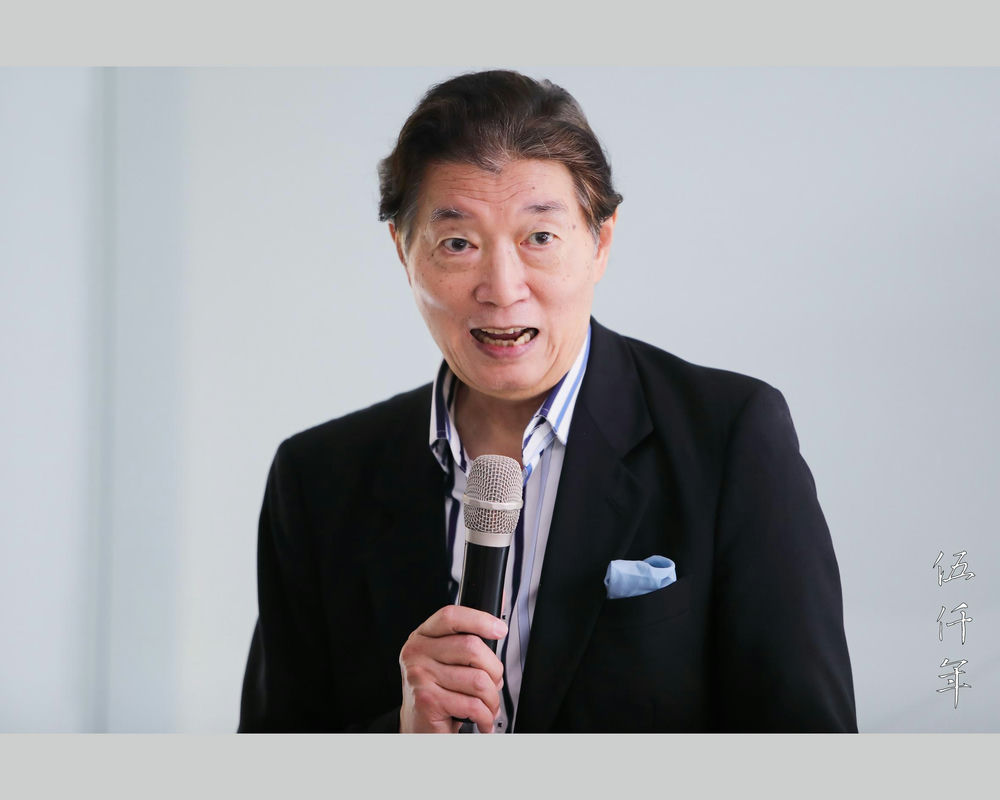
Portrait of Ambassador Shen Lyu-shun
